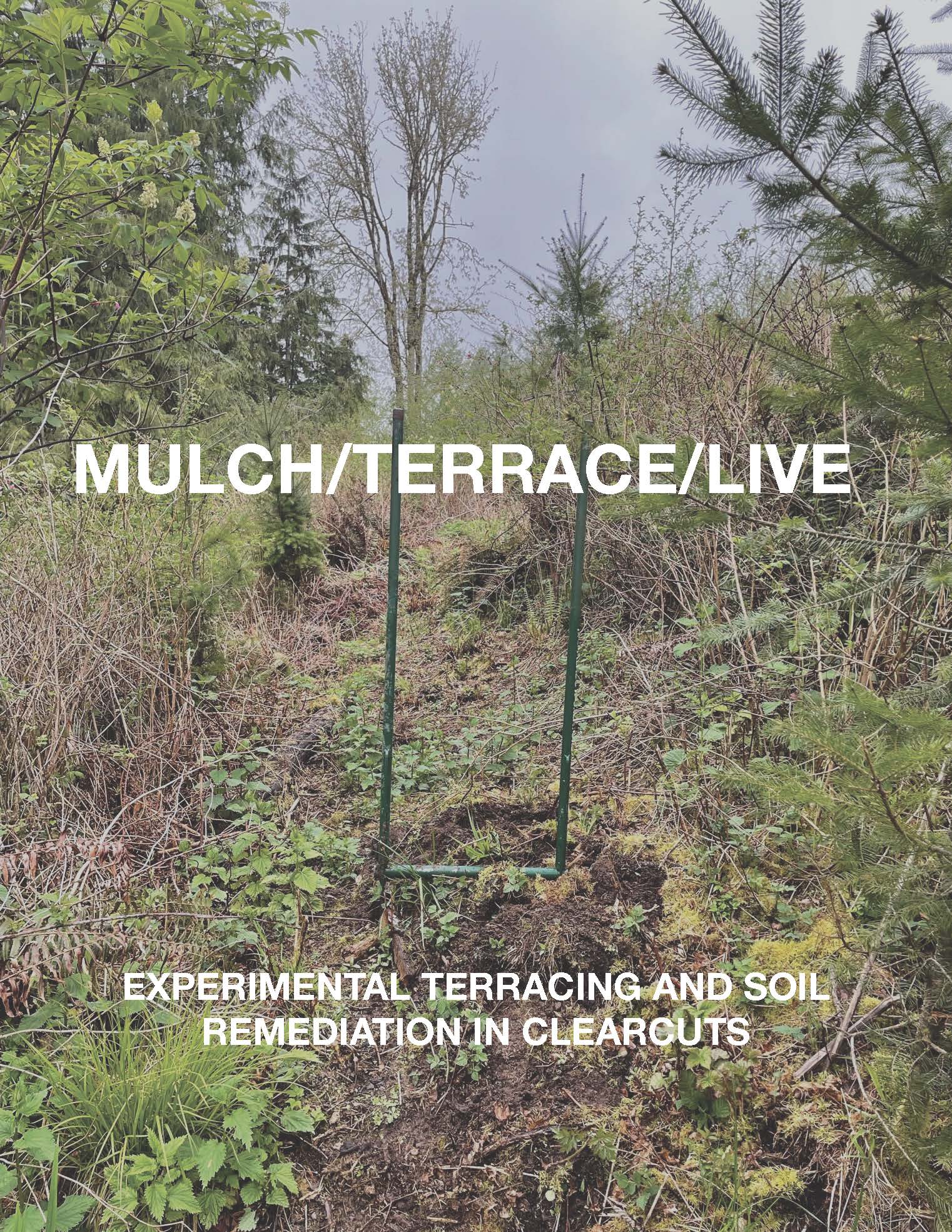Practice Foundation is an environmental nonprofit that works to advance alternative land-based practices. Our mission is to champion grass-roots projects that contribute to the health and well-being of people, their communities, and the environment.
Eligibility
Applicants from all career stages who are dedicated to the field of landscape are welcome to apply.
An accredited landscape architecture degree or professional license is not required.
Projects must be based in the United States or Canada.
Timeline
Applications due:
December 02, 2024
Awards granted:
February, 2025
Funding
Awards range from $5,000 -- $20,000 (USD).
Eligibility
Applicants from all career stages who are dedicated to the field of landscape are welcome to apply.
An accredited landscape architecture degree or professional license is not required.
Projects must be based in the United States or Canada.
Timeline
Applications due:
December 02, 2024
Awards granted:
February, 2025
Funding
Awards range from $5,000 to $20,000 (USD). We typically fund 1-3 projects a year.
Eligibility
Applicants from all career stages who are dedicated to the field of landscape are welcome to apply.
An accredited landscape architecture degree or professional license is not required.
Projects must be based in the United States or Canada.
Timeline
Applications due:
December 02, 2024
Awards granted:
February, 2025
Funding
Awards range from $5,000 to $20,000 (USD). We typically fund 1-3 projects a year.
Eligibility: Applicants from all career stages who are dedicated to the field of landscape are welcome to apply. An accredited landscape architecture degree or professional license is not required. Projects must be based in the United States or Canada.
Timeline: Applications due: December 02, 2024. Awards granted: February, 2025
Funding: Awards range from $5,000 to $20,000 (USD). We typically fund 1-3 projects a year.
Eligibility: Applicants from all career stages who are dedicated to the field of landscape are welcome to apply. An accredited landscape architecture degree or professional license is not required. Projects must be based in the United States or Canada.
Timeline: Applications due: December 02, 2024. Awards granted: February, 2025
Funding: Awards range from $5,000 to $20,000 (USD). We typically fund 1-3 projects a year.
The Practice Grant seeks to open access and expand approaches to landscape design by funding individuals and groups committed to alternative practices. Grants are awarded to applicants developing land-based* work and are offered in support of applied research and realized projects. The Practice Grant aims to bridge the gap between often informal land-based methods and professional practice. The Practice Grant was initiated to encourage alternative forms of land-based practice by providing funding and a network of support and exchange to Grantees. To practice is to repeat, to do, to act. It encompasses action and embraces momentum.
The Practice Grant aims to expand ...
The community of landscape designers and builders by providing opportunity to individuals and groups currently excluded from professional practice.
The methods by which landscapes are built by investigating alternative approaches and techniques for design, construction, and management.
The temporal framework of landscape projects by prioritizing projects that work in sync with landscape time, in alignment with soil, air, water and plant cycles.
*Land-based includes any applied efforts that are tied to the land itself; from landscape architecture to ecology, planning, gardening, farming, arboriculture, and conservation.
The Practice Grant seeks to open access and expand approaches to landscape design by funding individuals and groups committed to alternative practices. Grants are awarded to applicants developing land-based* work and are offered in support of applied research and realized projects. The Practice Grant aims to bridge the gap between often informal land-based methods and professional practice. The Practice Grant was initiated to encourage alternative forms of land-based practice by providing funding and a network of support and exchange to Grantees. To practice is to repeat, to do, to act. It encompasses action and embraces momentum.
The Practice Grant aims to expand ...
The community of landscape designers and builders by providing opportunity to individuals and groups currently excluded from professional practice.
The methods by which landscapes are built by investigating alternative approaches and techniques for design, construction, and management.
The temporal framework of landscape projects by prioritizing projects that work in sync with landscape time, in alignment with soil, air, water and plant cycles.
*Land-based includes any applied efforts that are tied to the land itself; from landscape architecture to ecology, planning, gardening, farming, arboriculture, and conservation.
The Practice Grant seeks to open access and expand approaches to landscape design by funding individuals and groups committed to alternative practices. Grants are awarded to applicants developing land-based* work and are offered in support of applied research and realized projects. The Practice Grant aims to bridge the gap between often informal land-based methods and professional practice. The Practice Grant was initiated to encourage alternative forms of land-based practice by providing funding and a network of support and exchange to Grantees. To practice is to repeat, to do, to act. It encompasses action and embraces momentum.
The Practice Grant aims to expand ...
The community of landscape designers and builders by providing opportunity to individuals and groups currently excluded from professional practice.
The methods by which landscapes are built by investigating alternative approaches and techniques for design, construction, and management.
The temporal framework of landscape projects by prioritizing projects that work in sync with landscape time, in alignment with soil, air, water and plant cycles.
*Land-based includes any applied efforts that are tied to the land itself; from landscape architecture to ecology, planning, gardening, farming, arboriculture, and conservation.
The Practice Grant seeks to open access and expand approaches to landscape design by funding individuals and groups committed to alternative practices. Grants are awarded to applicants developing land-based* work and are offered in support of applied research and realized projects. The Practice Grant aims to bridge the gap between often informal land-based methods and professional practice. The Practice Grant was initiated to encourage alternative forms of land-based practice by providing funding and a network of support and exchange to Grantees. To practice is to repeat, to do, to act. It encompasses action and embraces momentum.
The Practice Grant aims to expand ...
The community of landscape designers and builders by providing opportunity to individuals and groups currently excluded from professional practice.
The methods by which landscapes are built by investigating alternative approaches and techniques for design, construction, and management.
The temporal framework of landscape projects by prioritizing projects that work in sync with landscape time, in alignment with soil, air, water and plant cycles.
*Land-based includes any applied efforts that are tied to the land itself; from landscape architecture to ecology, planning, gardening, farming, arboriculture, and conservation.
Our primary selection criteria include a demonstration of feasibility, a clear method or practice, a committed client or partner, and an available project site. We are looking for applied research and design ideas that are "shovel ready" and need additional funding to be realized.
The Practice Grant is a project grant given in support of work defined in the proposal. We are not able to fund indirect costs including ongoing overhead and administration that support an organization’s general operation.
One of the primary objectives of the Practice Grant is to develop a more expansive and inclusive community of landscape designers, cultivators and builders by funding the work of individuals and groups currently outside of conventional professional practice. With this is mind, please reach out with any questions; we are happy to discuss your application and are open to considering substitutions to application requirements. We provide support through all phases, including the application.
Questions? grant@practicelandscape.com
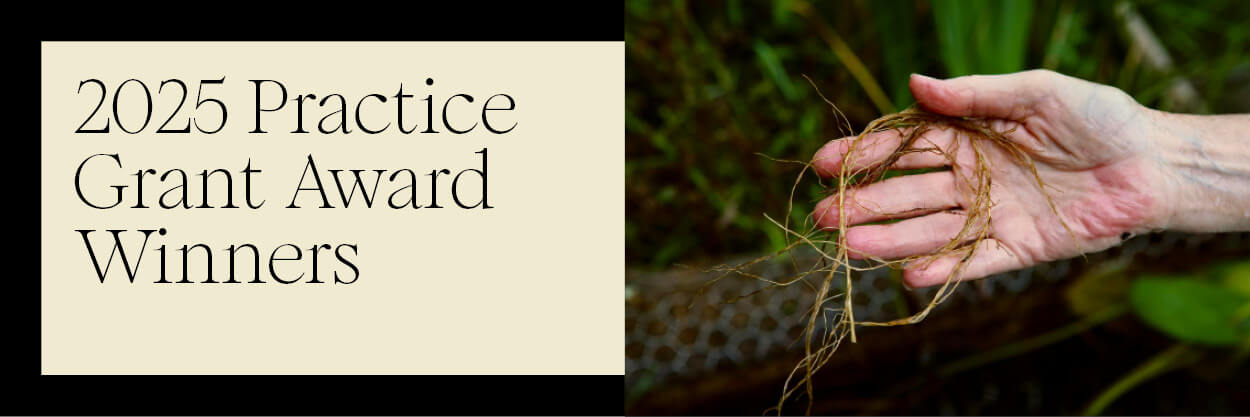
In only 5 years, our not-for profit Practice Foundation awarded $100,000 in directing funding to land-based practitioners in the U.S. and Canada. This year, Practice Grant was awarded to two remarkable teams. Thank you to the 2025 Selection Jury: Fadi Masoud, Jen Toy and Sharon Ullman.
Groundwork Collective
The New Garden Society
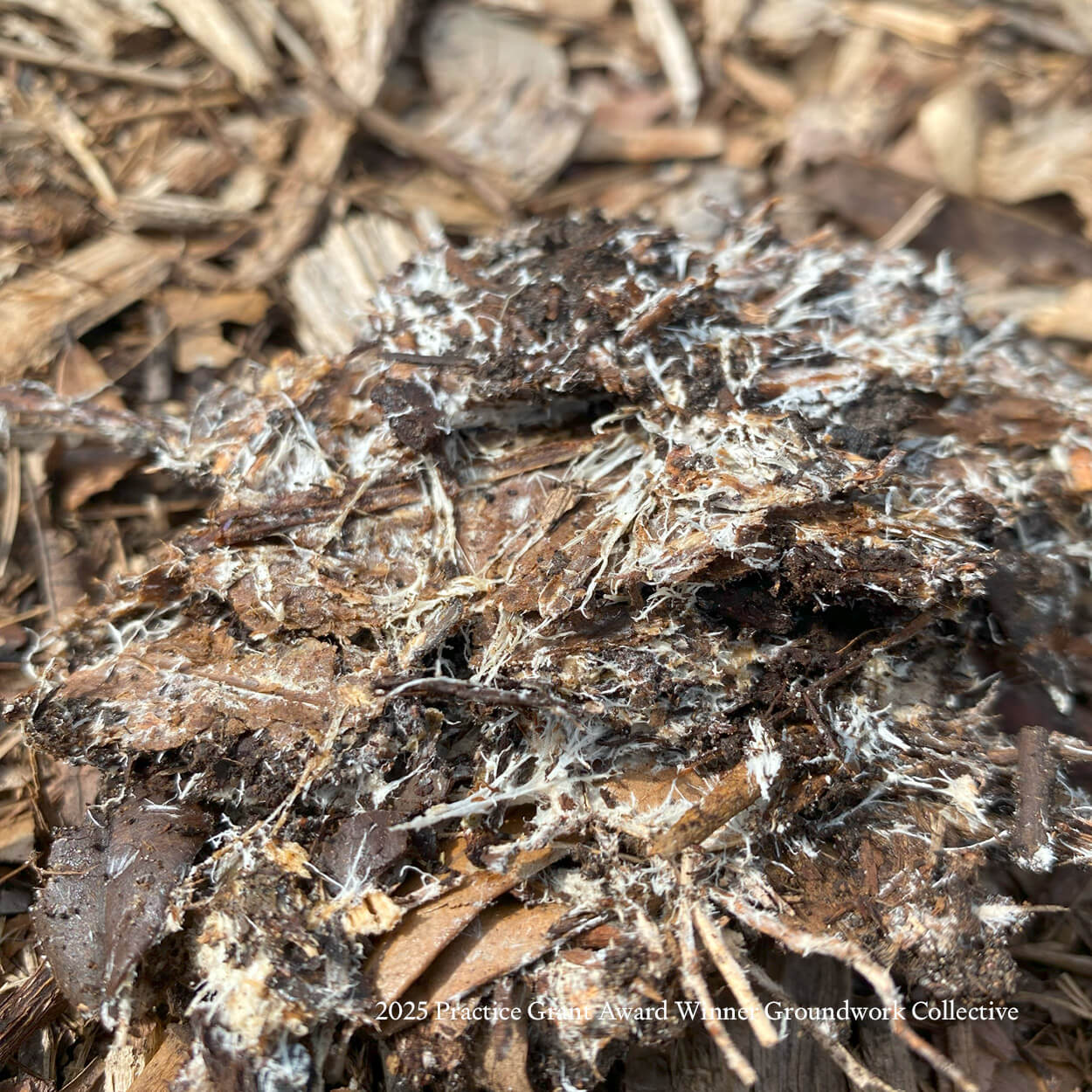
“Ms. Sybil’s Yard: A domestic community that includes Plants, Fungi & Microbes”
Groundwork Collective are working with their neighbors in New Orleans to reclaim public space through soil remediation. The project begins with an experimental plot in a domestic yard that tests methods for at-home lead remediation. Standard methods of lead remediation are cost prohibitive and restrict the creation of safe, usable domestic space. Making healthy soil starts with testing to identify contaminants, the associations between existing bacterial and fungal communities neutralization rates, and plants selected for contaminate uptake. A novel practice emerges in the ways human communities can monitor, transform, and dispose of hazardous compounds in soils to increase human health and well-being. Ms. Sybil’s Yard serves as a prototype site for at-home bioremediation that includes training materials and a database for people looking to take matters into their own hands. The 2025 Practice Grant will support Ms. Sybil’s Yard as a first step in this collaborative effort. The Groundwork Collective consists of Victor Davidson, Woh Listen, Anna ‘A.K’ Miller, and Justin James and the Small & Mighty Land Cooperative.
The New Garden Society
Boston, Massachusetts, USA
The New Garden Society (TNGS) works behind prison walls with groups of incarcerated gardeners to promote agency and dignity through land-based practice. Incarcerated gardeners steward all design ideas by setting into motion practices that include: 1). Co-creating diverse and nourishing shared spaces planted with culturally significant species. 2). Selecting and propagating plants for the garden by learning to propagate cuttings, divide perennials, save seeds and reach out to local seed savers. 3). Maintaining a connection across cohorts by learning to keep maps, logs, signage, and manuals to grow knowledge for future caretakers. The 2024 Practice Grant will be used to expand this important program by supporting two sites at Massachusetts corrections facilities in Boston.
TNGS is a collective of horticulturists and educators including Erika Rumbley, Renée Portanova, Rachel Lewis, and Sydney Mark.
Movement Education Outdoors + Below and Above Collective
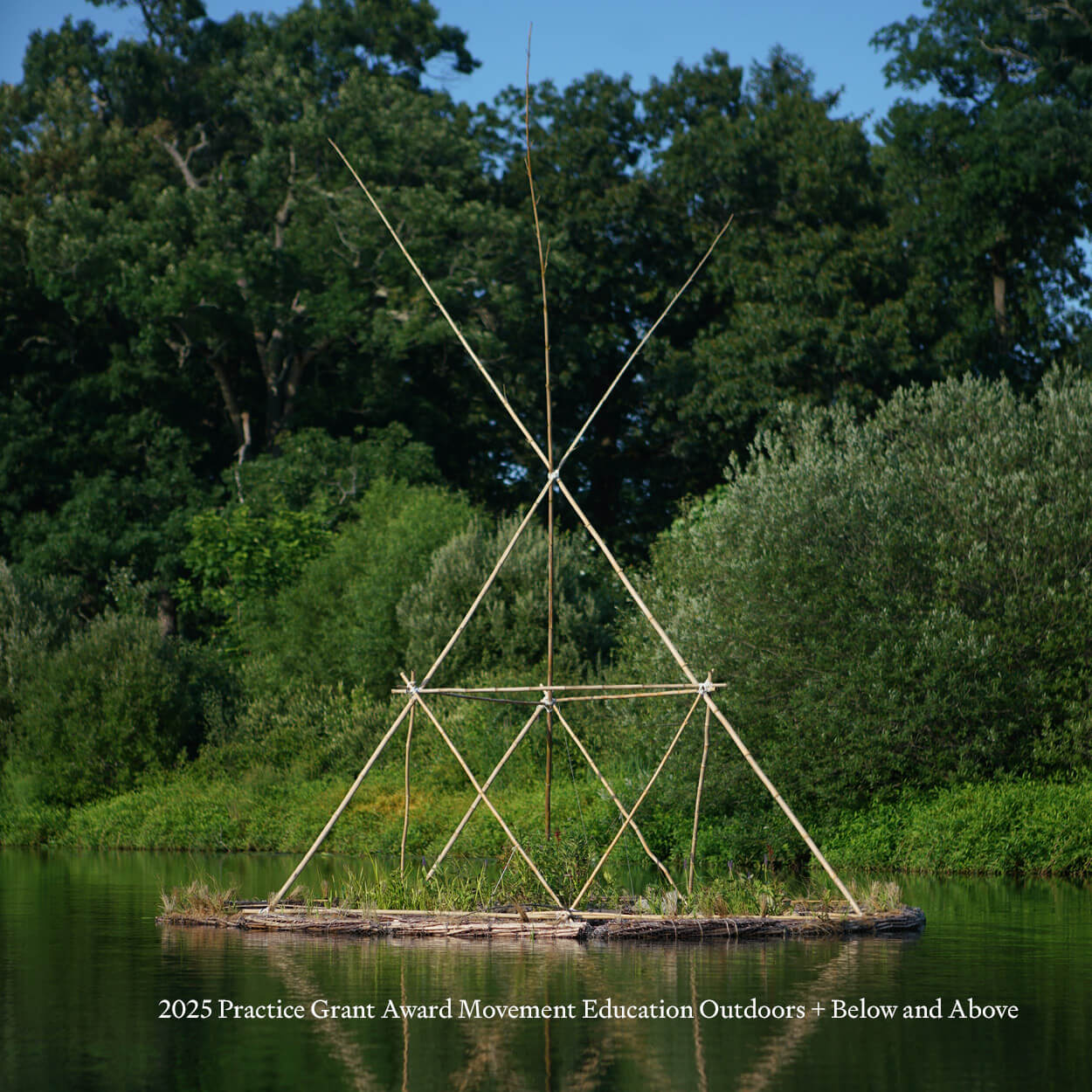
“Floating Wetlands as Living Classroom”
Movement Education Outdoors (MEO) and Below and Above Collective (BAC) develop and test approaches to land and water stewardship with high school students. Drawing on MEO’s teaching experience in farming and aquaculture, and BAC’s expertise in blending art with ecology through floating wetlands, this project combines the strengths of both groups. The project’s innovation lies in using dried stalks of Fallopia japonica (Japanese knotweed), a non-native plant species, to construct floating rafts. The collaboration prioritizes Black, Brown, POC and low-income youth leadership throughout, from harvesting and building to planting and monitoring the floating wetland during Summer and Fall 2025. A six-week curriculum will be developed to encourage students to document plant growth over time and deepen their connection with the floating wetland through its plants, microorganisms, and natural processes. The 2025 Practice Grant will support the full implementation of the program, including the creation of an open-source curriculum and a “How to Build a Floating Wetland With Japanese Knotweed” manual. Movement Education Outdoors and Below and Above Collective will work closely with the Stormwater Innovation Center and the Providence Parks Department to carry out the project at Polo Lake in Roger Williams Park, Providence, Rhode Island.
2024 Practice Grant Award Winners.
2024 Practice Grant Award Winners
2024 Practice Grant Award Winners
2024 Practice Grant Award Winners
2024 Practice Grant Award Winners
The 2024 Selection Jury included: Aron Chang (the Water Leaders Institute, co-founder and member of Civic Studio), Horatio Joyce (Director of Programs & Education at The Garden Conservancy), and Stacy Passmore (Principal, Co-Founder of Superbloom).
The New Garden Society
The New Garden Society
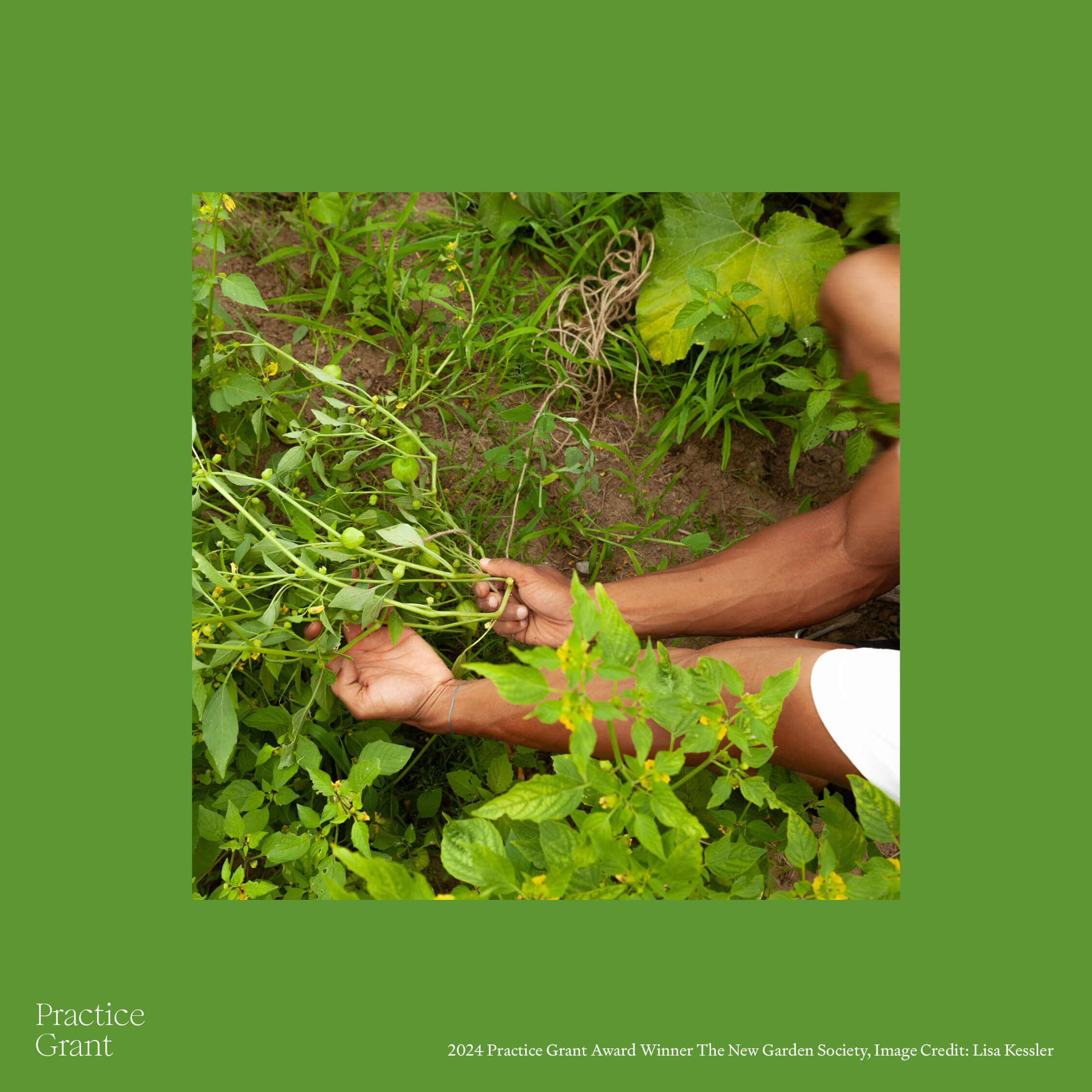
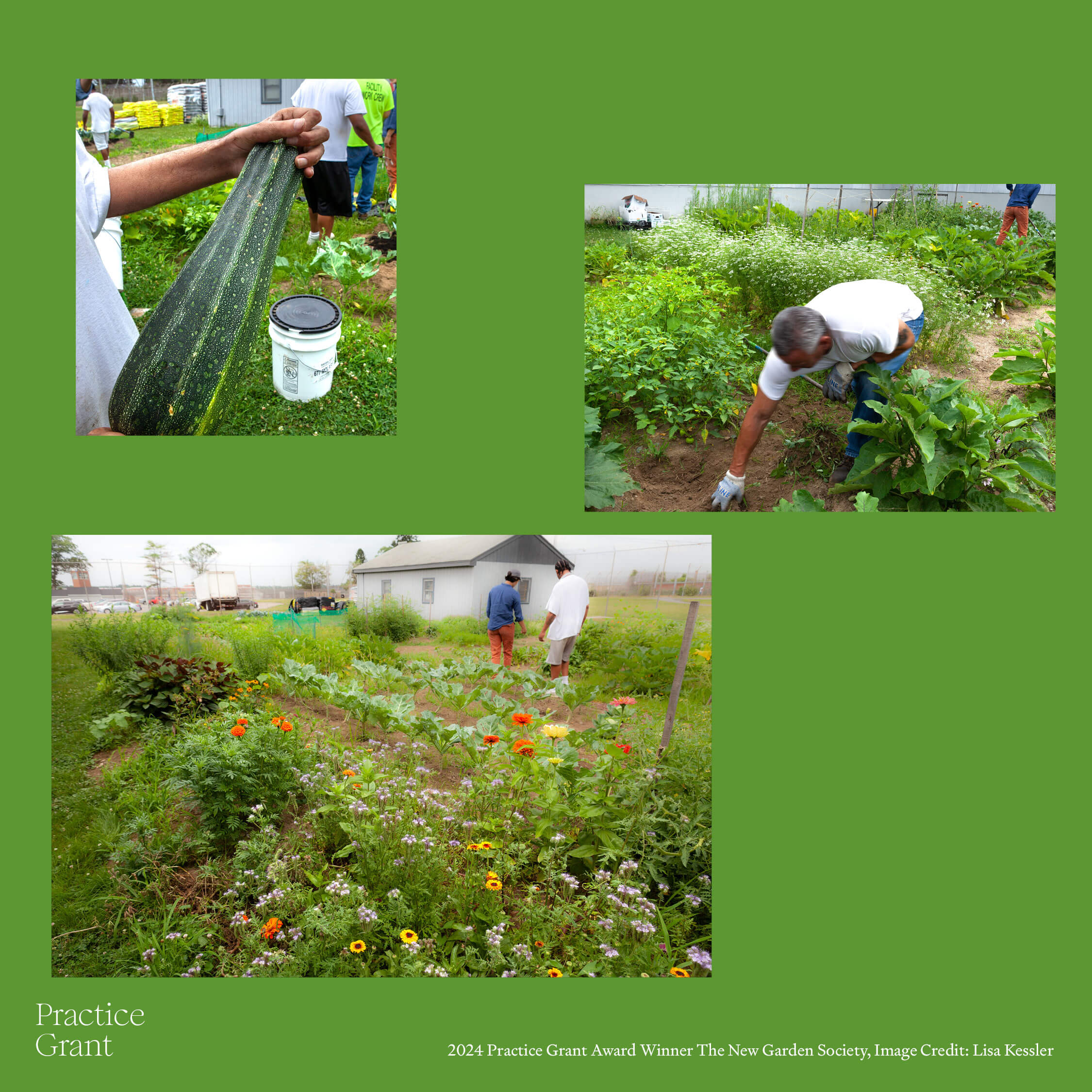
The New Garden Society
Boston, Massachusetts, USA
The New Garden Society (TNGS) works behind prison walls with groups of incarcerated gardeners to promote agency and dignity through land-based practice. Incarcerated gardeners steward all design ideas by setting into motion practices that include: 1). Co-creating diverse and nourishing shared spaces planted with culturally significant species. 2). Selecting and propagating plants for the garden by learning to propagate cuttings, divide perennials, save seeds and reach out to local seed savers. 3). Maintaining a connection across cohorts by learning to keep maps, logs, signage, and manuals to grow knowledge for future caretakers. The 2024 Practice Grant will be used to expand this important program by supporting two sites at Massachusetts corrections facilities in Boston.
TNGS is a collective of horticulturists and educators including Erika Rumbley, Renée Portanova, Rachel Lewis, and Sydney Mark.
The New Garden Society
Boston, Massachusetts, USA
The New Garden Society (TNGS) works behind prison walls with groups of incarcerated gardeners to promote agency and dignity through land-based practice. Incarcerated gardeners steward all design ideas by setting into motion practices that include: 1). Co-creating diverse and nourishing shared spaces planted with culturally significant species. 2). Selecting and propagating plants for the garden by learning to propagate cuttings, divide perennials, save seeds and reach out to local seed savers. 3). Maintaining a connection across cohorts by learning to keep maps, logs, signage, and manuals to grow knowledge for future caretakers. The 2024 Practice Grant will be used to expand this important program by supporting two sites at Massachusetts corrections facilities in Boston.
TNGS is a collective of horticulturists and educators including Erika Rumbley, Renée Portanova, Rachel Lewis, and Sydney Mark.
Anormalidad Gardens
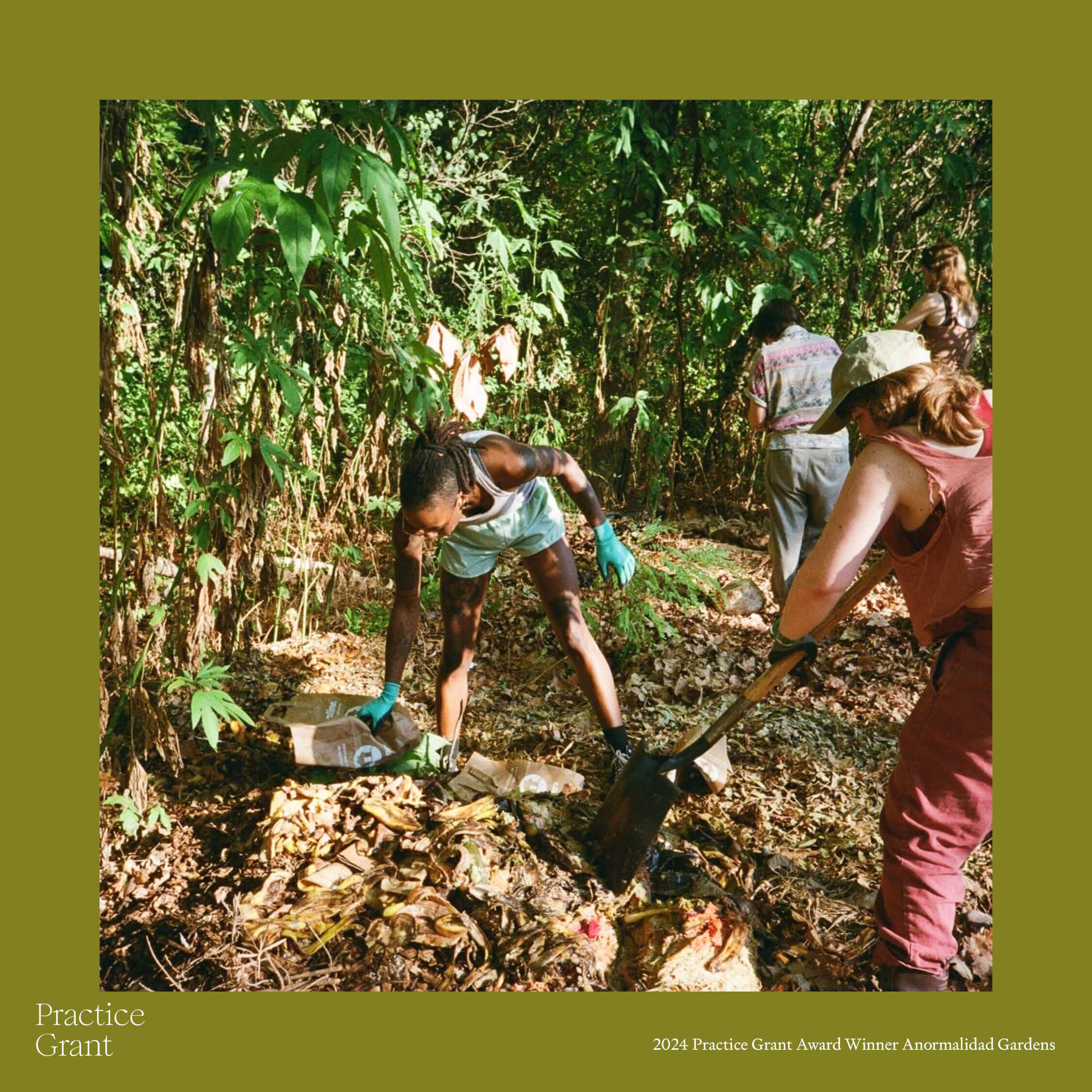
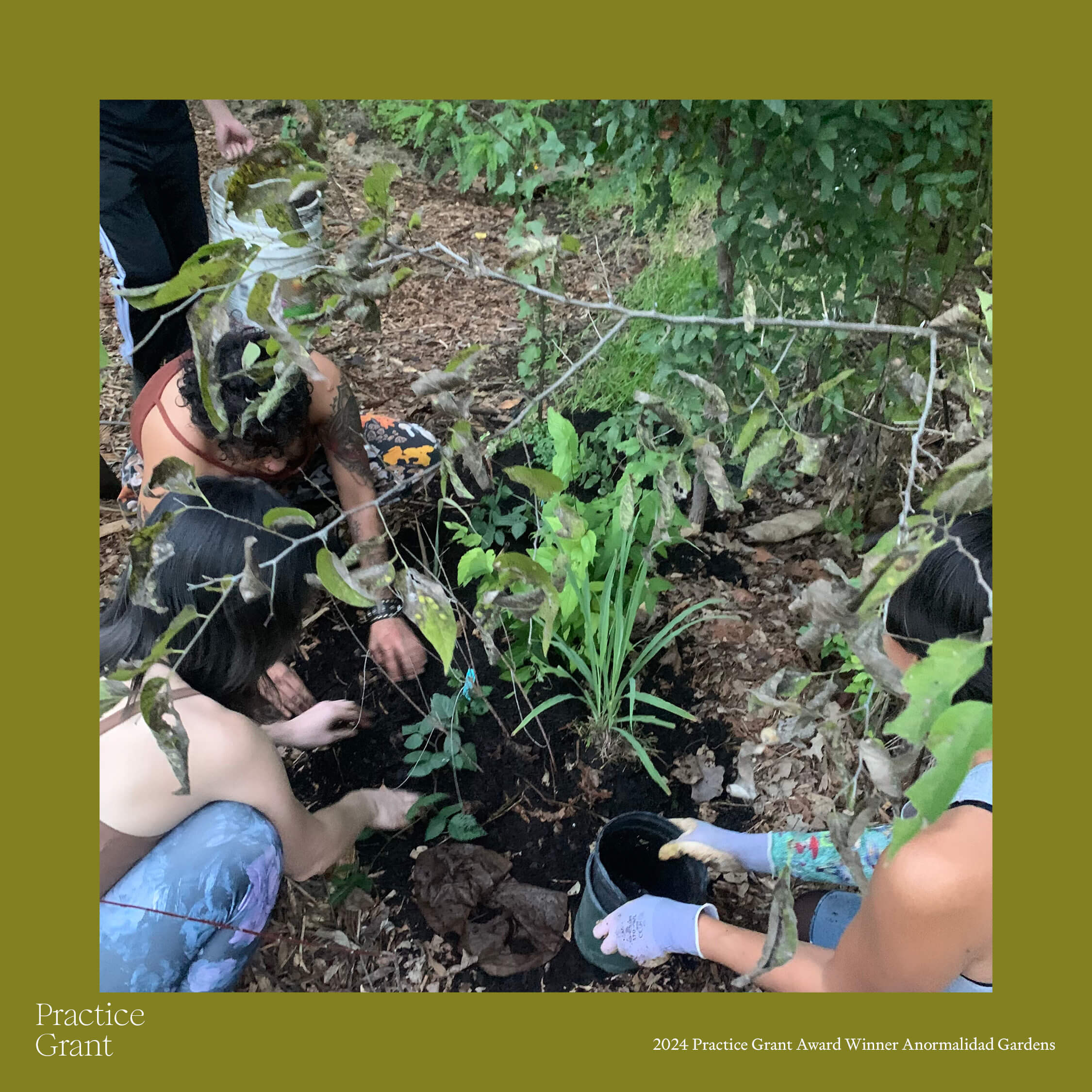
Anormalidad Gardens
Austin, Texas, USA
Anormalidad Gardens is a community collaborative creating direct access to perennial agriculture and crop trees in their neighborhood and home in East Austin, Texas. Working together, Anormalidad Gardens help nurture otherwise neglected and long-abandoned patches of land by planting and tending to food forests, a form of mutual support that fosters public connection and personal interdependence. The saying is, “We must eat now and later,” so annuals and canopy trees are planted on the same day, setting in motion a decentralized food system for years to come. The 2024 Practice Grant will advance a series of experimental and non-aggressive practices to remove crabgrass and other spontaneous species through sheet mulching, as well as provide in-kind support for expansion.
The Anormalidad Gardens exist within a broader project, Anormalidad Cooperative, that addressed displacement and resource disparity to otherwise marginalized residents.
Practice Grant 2023 Award Winners
2023 Practice Grant Award Winners
2023 Practice Grant Award Winners
The 2023 Selection Jury included: Jenny Evans (Sanibel Captiva Conservation Foundation, Florida Association of Native Nurseries), John Koepke (Landscape Architect and Professor Emeritus at the University of Minnesota College of Design), Thaïsa Way (Director of Garden & Landscape Studies at Dumbarton Oaks Research Library and Collection, Professor Emerita at the University of Washington in the College of Built Environments).
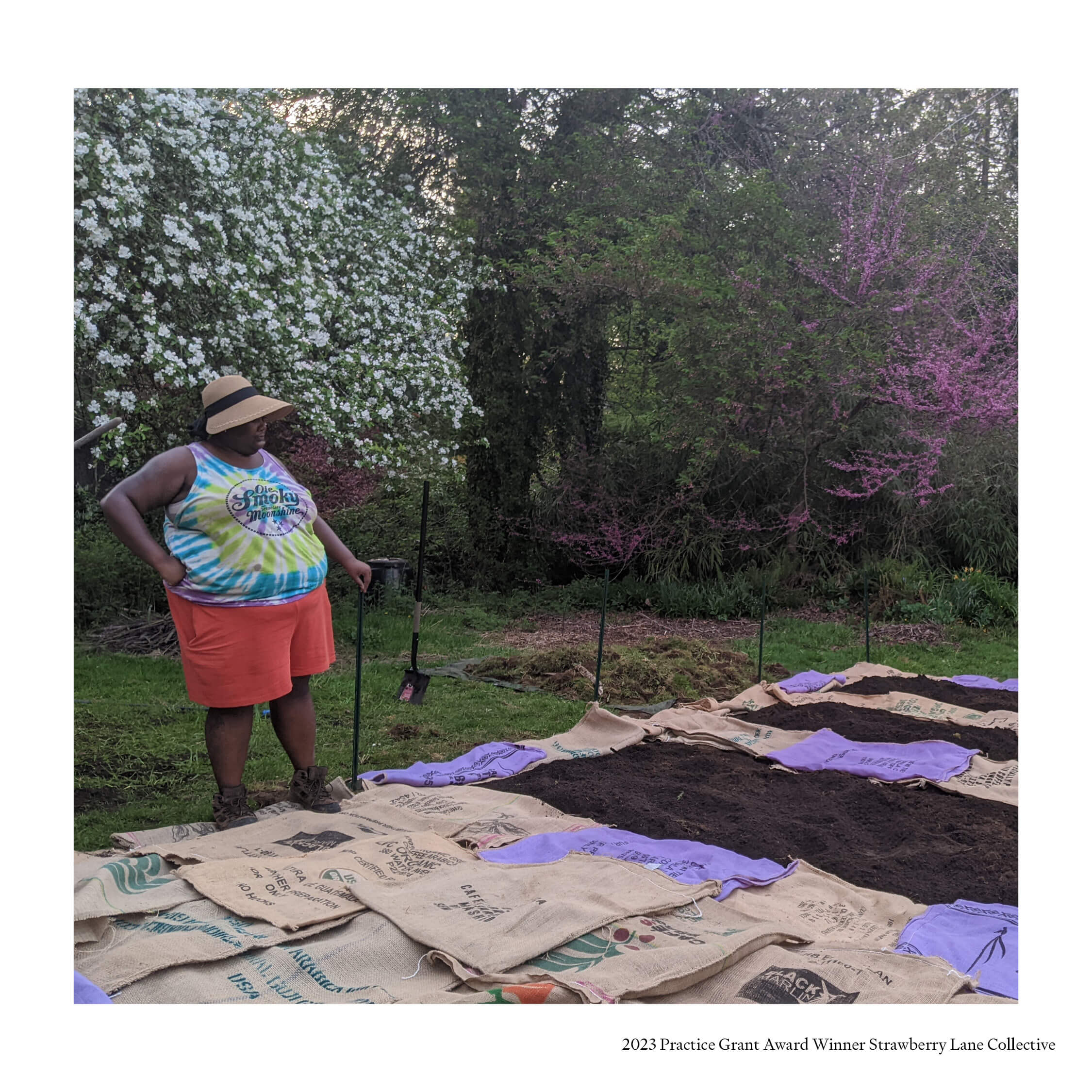
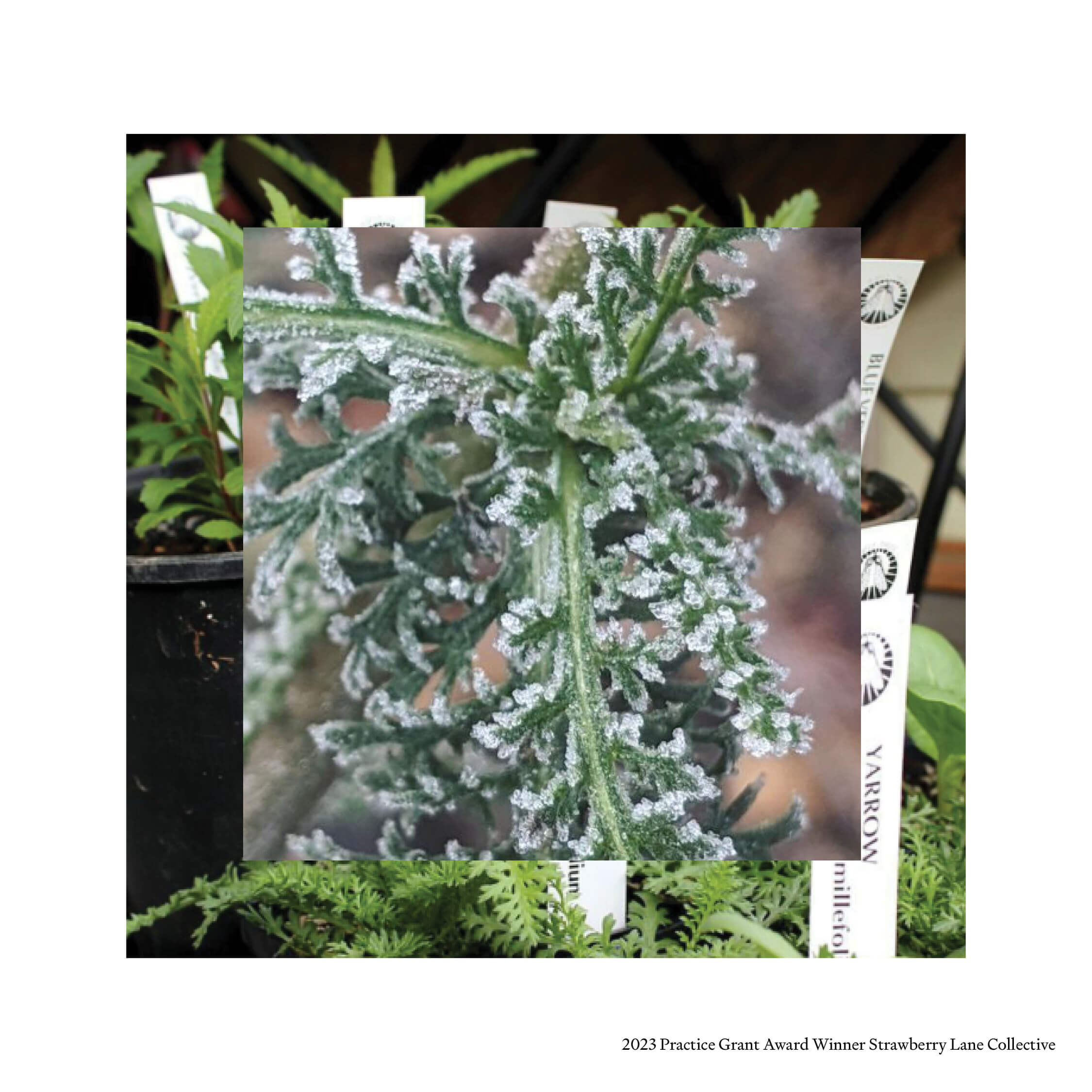
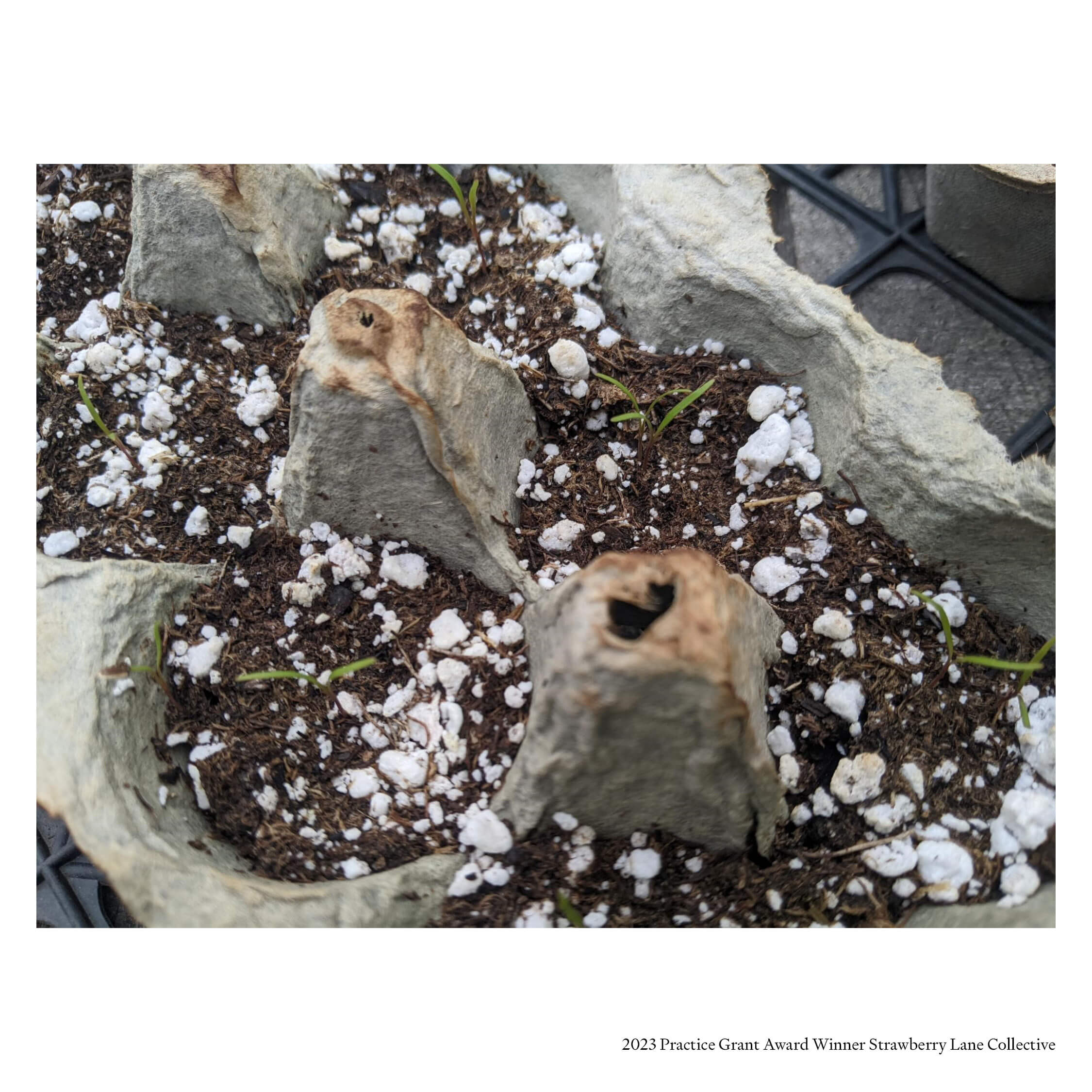
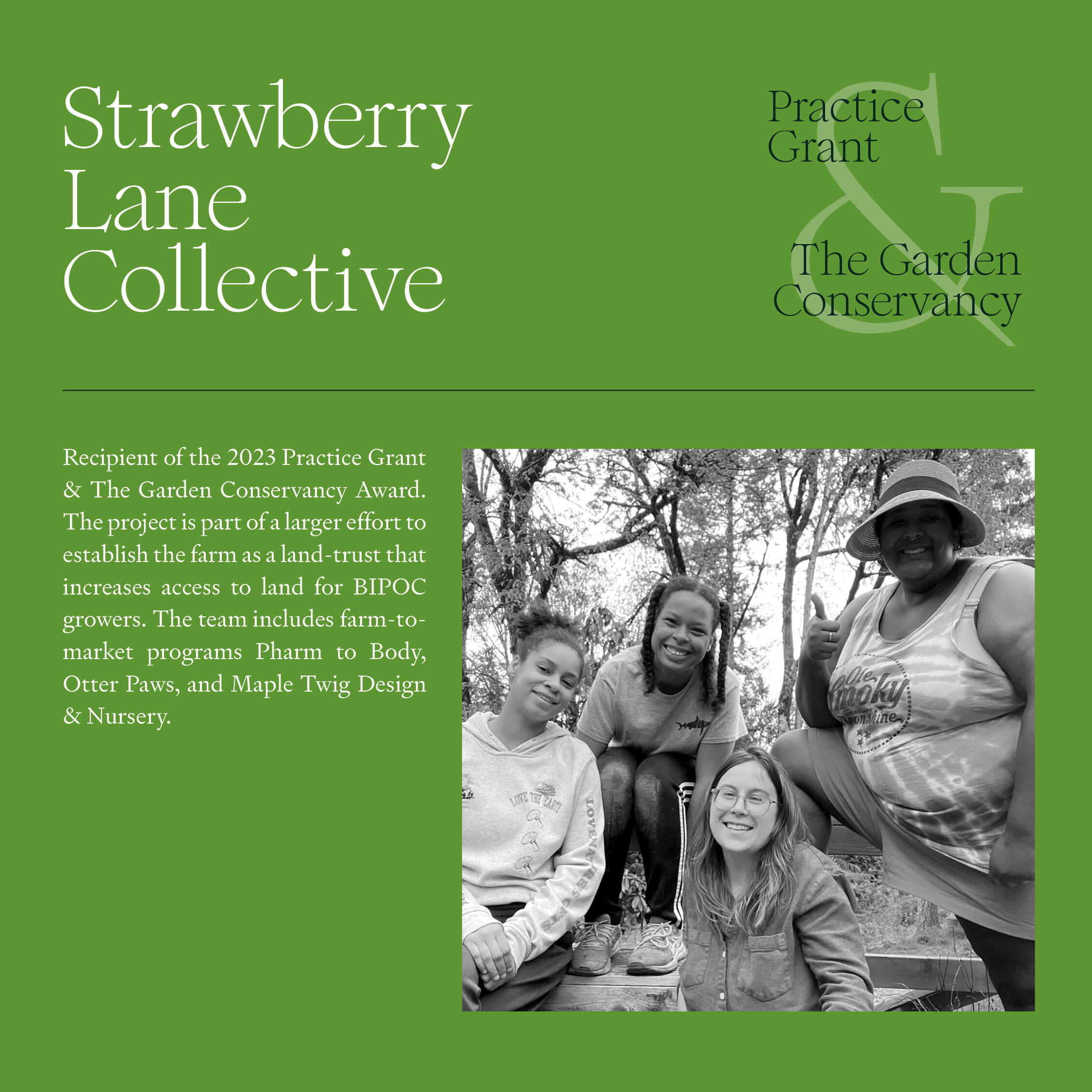
Strawberry Lane Collective
Dennise Mofidi, Jasmine Barber, Dorian Campbell, and Dawn Cohoe
Milwaukie, Oregon, USA
Rotate, Graze, Grow tests the rotational grazing of blackbelly sheep to manage aggressive English Ivy (Hedera helix) and Himalayan Blackberry (Rubus armeniacus) at a cooperative farm. The project values the health of the soil in cities, introducing regular testing and mycoremediation to monitor each newly established management practice. The project is part of a larger effort to establish the farm as a land-trust that increases access to land for BIPOC growers. The team includes farm-to-market programs Pharm to Body (‘Spore Sistaz’: Dennise Mofidi, Jasmine Barber,), Otter Paws (Dorian Campbell), and Maple Twig Design & Nursery (Dawn Cohoe).
Rotate, Graze, Grow is the recipient of the 2023 Practice Grant & The Garden Conservancy Award.
Strawberry Lane Collective
Dennise Mofidi, Jasmine Barber, Dorian Campbell, and Dawn Cohoe
Milwaukie, Oregon, USA
Rotate, Graze, Grow tests the rotational grazing of blackbelly sheep to manage aggressive English Ivy (Hedera helix) and Himalayan Blackberry (Rubus armeniacus) at a cooperative farm. The project values the health of the soil in cities, introducing regular testing and mycoremediation to monitor each newly established management practice. The project is part of a larger effort to establish the farm as a land-trust that increases access to land for BIPOC growers. The team includes farm-to-market programs Pharm to Body (‘Spore Sistaz’: Dennise Mofidi, Jasmine Barber,), Otter Paws (Dorian Campbell), and Maple Twig Design & Nursery (Dawn Cohoe).
Rotate, Graze, Grow is the recipient of the 2023 Practice Grant & The Garden Conservancy Award.
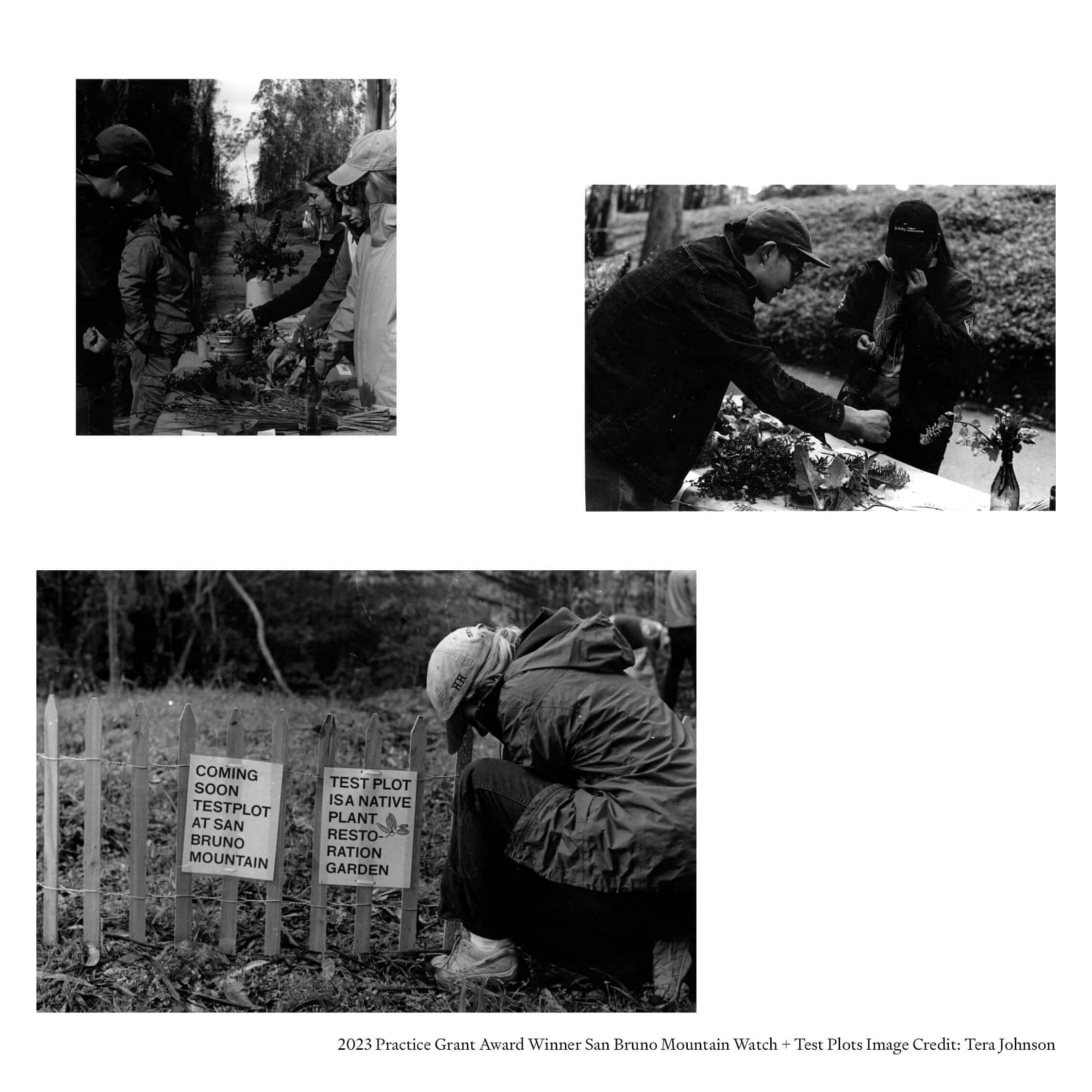
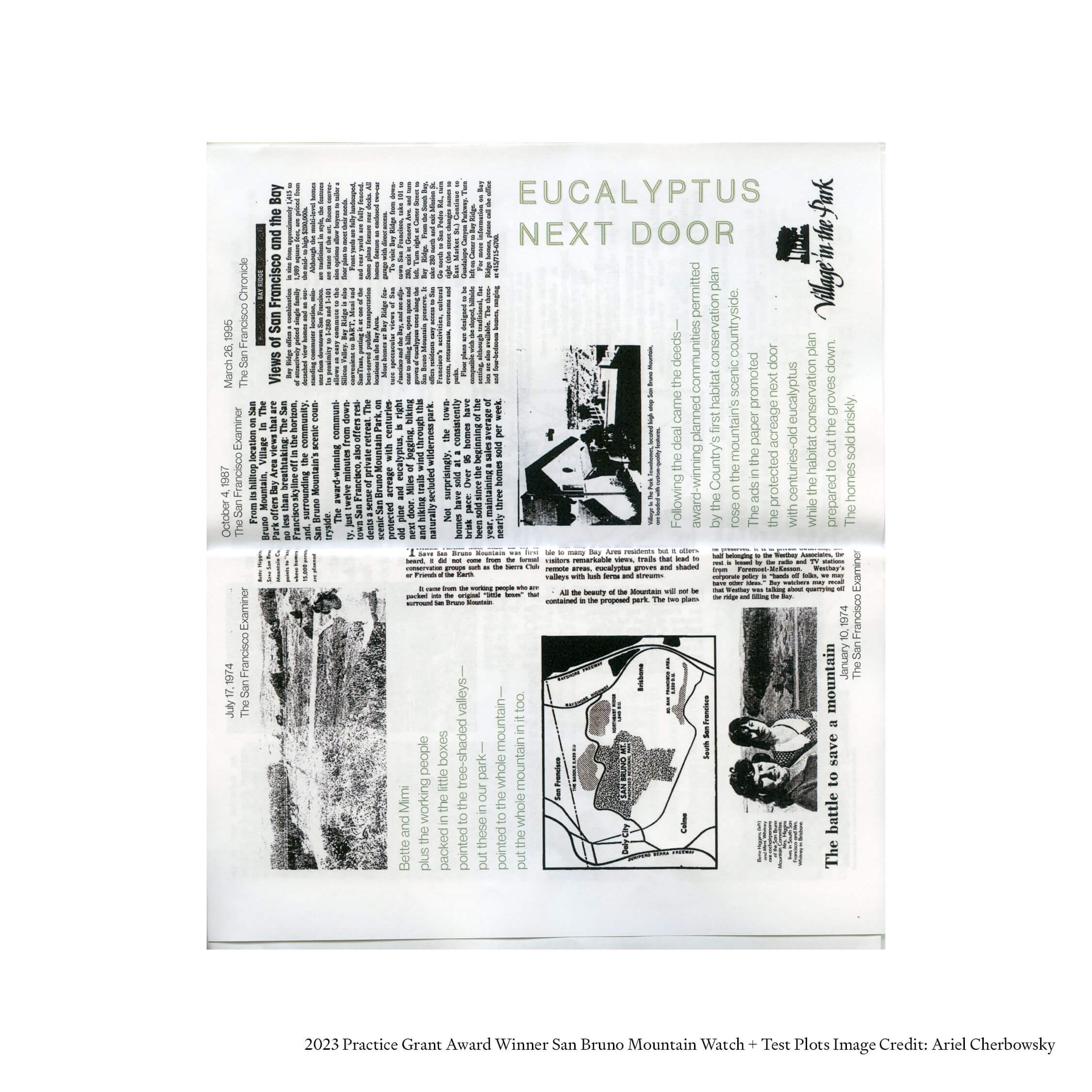
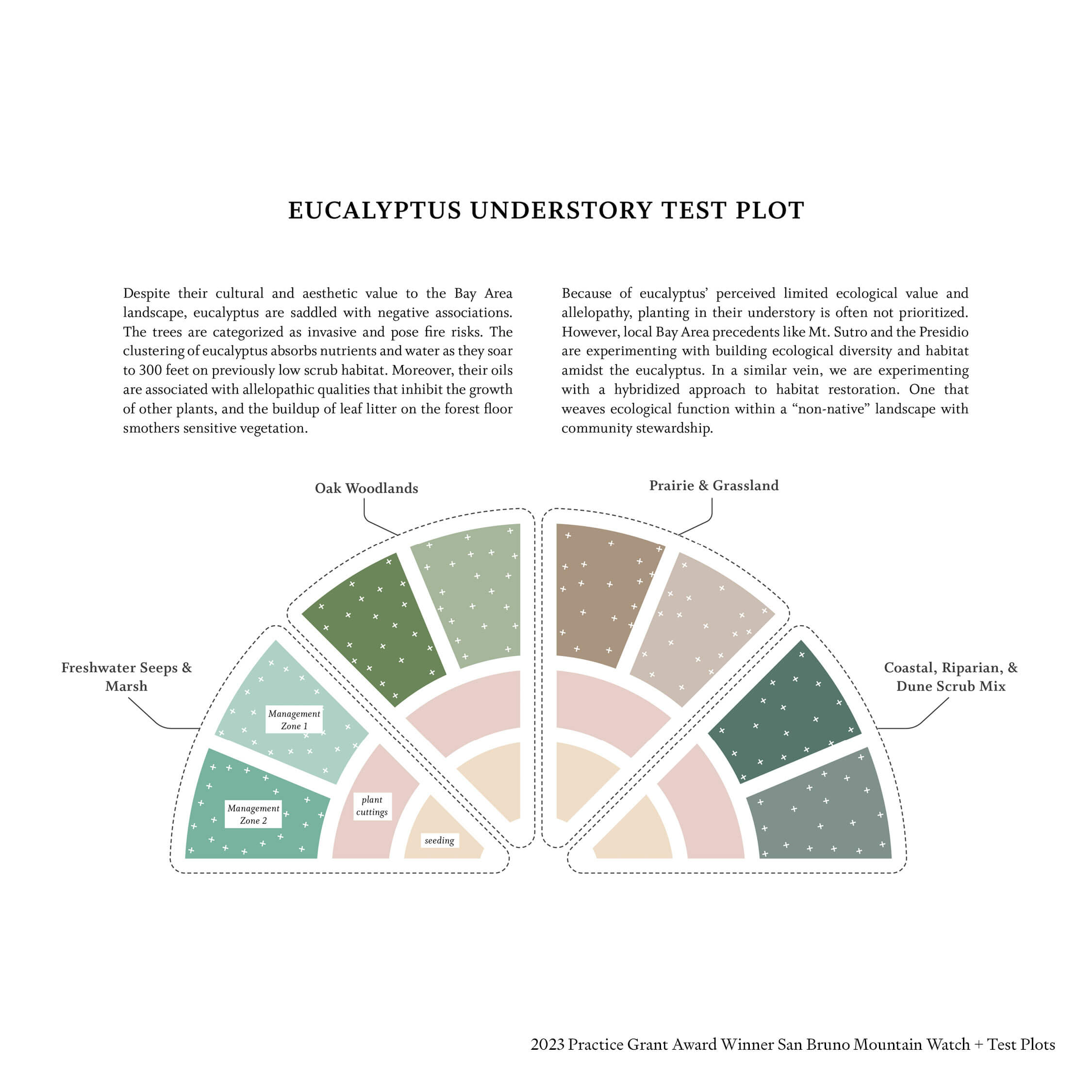
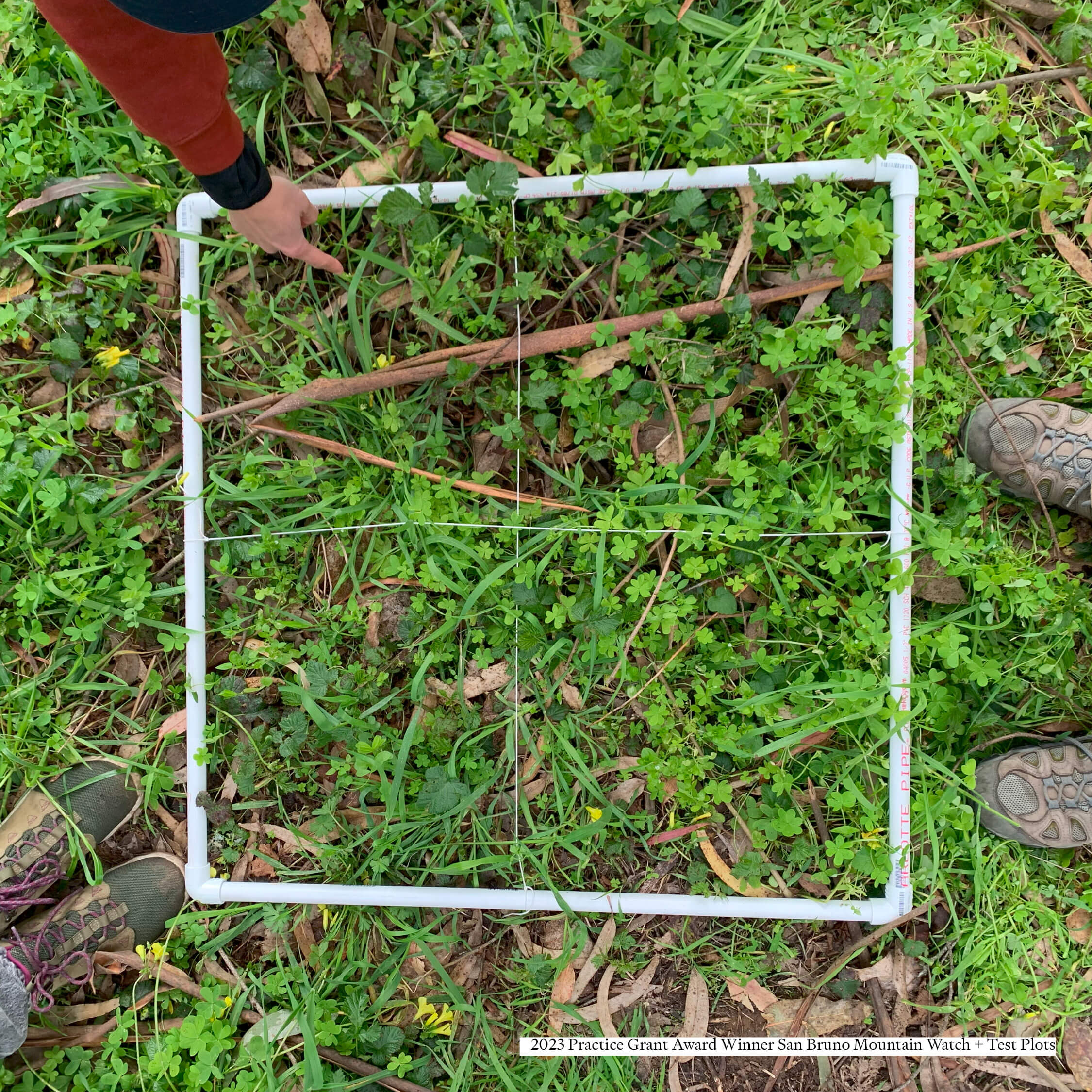
San Bruno Mountain Watch + Test Plot
Chris Chou, Yoni Carnice and Jen Toy
Daly City, California, USA
On Ticky Tacky Hillsides works within San Bruno Mountain Park to increase access to an underserved side of the mountain through long-term landscape stewardship. The project will be designed, installed, and maintained with the neighboring community, prioritizing the unique cultural values of diverse residents. The plan includes hiring a ‘Stewardship Fellow’, along with providing guidelines for experimental planting, species management, multi-lingual signage, accessible seating, and public design workshops events. The project is a collaboration between San Bruno Mountain Watch (Chris Chou and Yoni Carnice), an organization that leads community-based ecological restoration programs, and Test Plot (Jen Toy), a land-based practice that celebrates the labor involved in caring for the land.
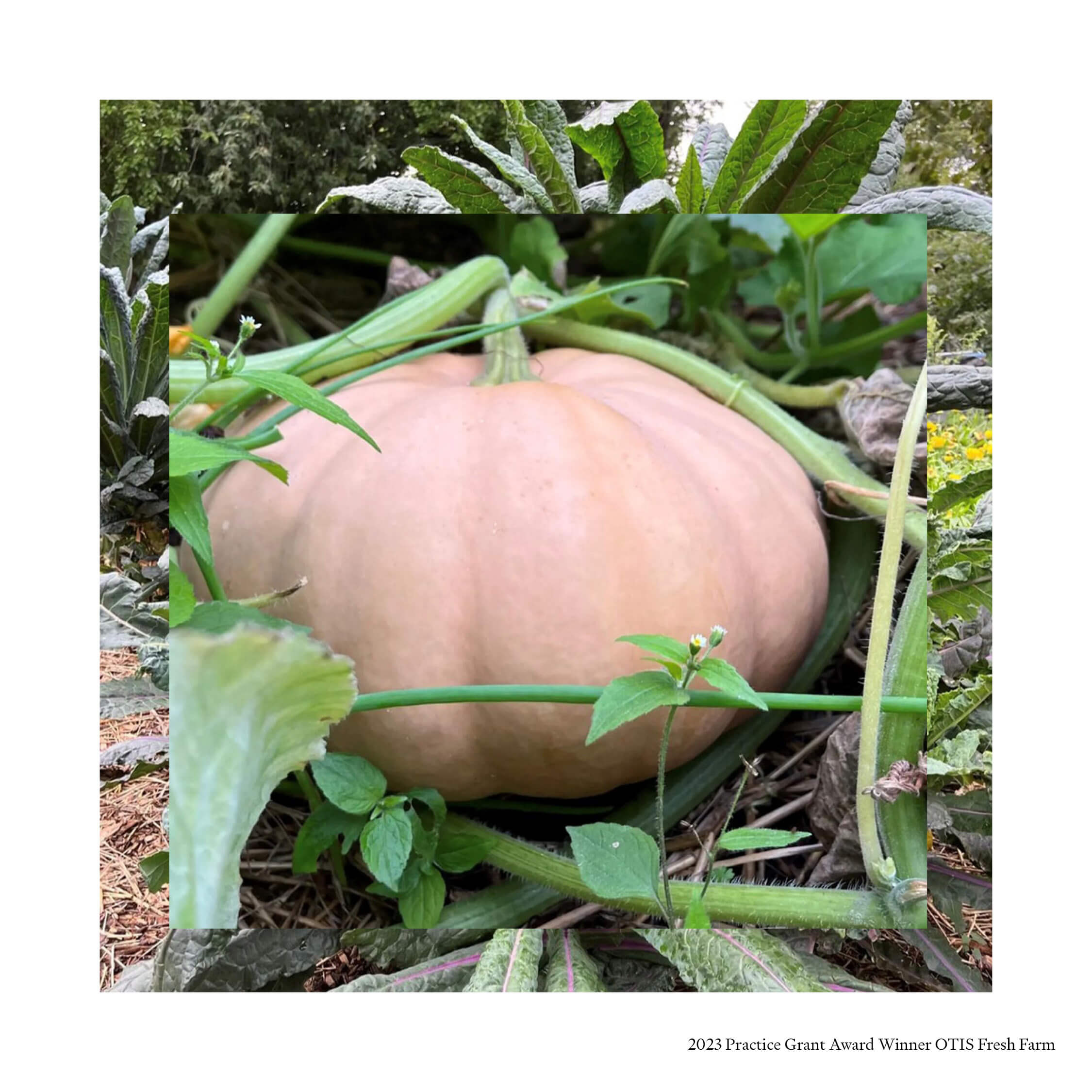
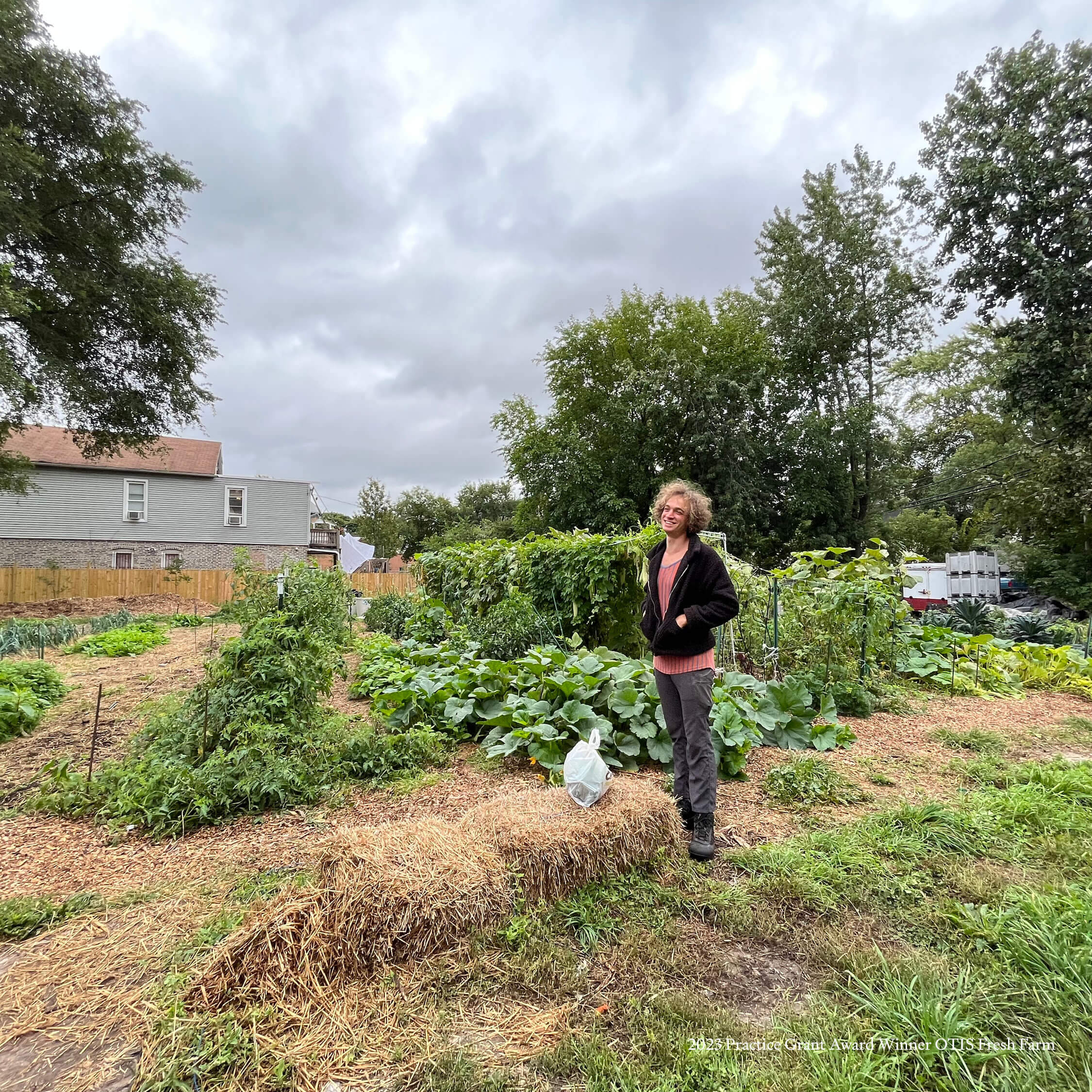
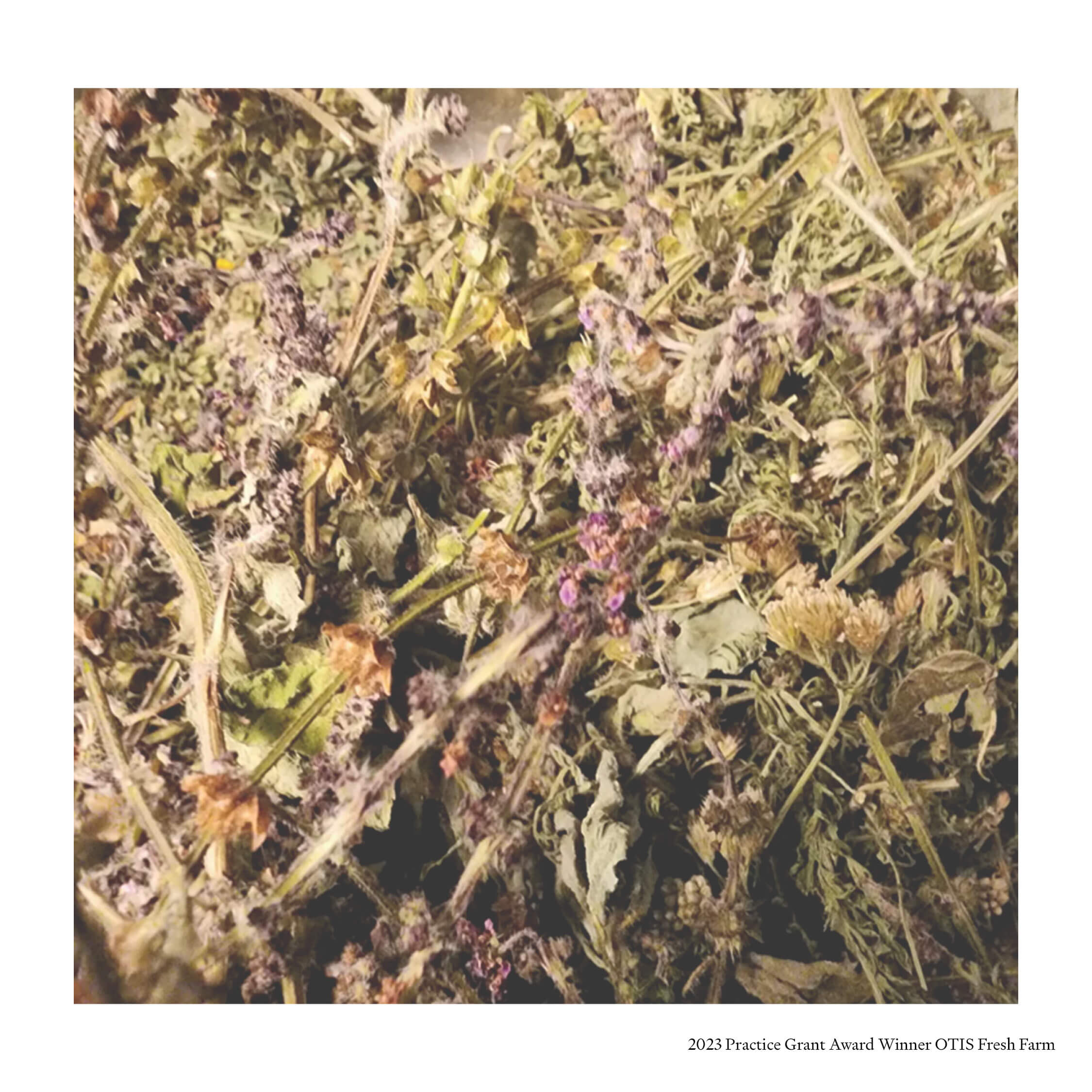
OTIS Fresh Farm
Mabel Gladly and Pooj Rav
Chicago, Illinois, USA
Cultivating the Commons: Fenceless Farming, expands the efforts at OTIS Fresh Farm to engage neighbors and retain accessibility of a busy community thoroughfare. In lieu of fencing, the design will install diverse, pollinator-friendly bioswales to create a buffer along the heavily trafficked urban edge. This increases efficiency for on-going maintenance and grades the remaining land to establish a farmstand and community meeting place. The bioswales are also part of an applied research project to test, document, and share guidelines for the use of Midwest friendly grains as a native grain cover crop. OTIS Fresh LWCA is a cooperatively run and trans-owned farm on Chicago's south side that grows vegetables and herbs sold through their CSA program. The co-owners in the workers cooperative are Mabel, the founder of Grow-Op Chicago, and Pooj, an environmental chemist and community organizer.
2022 Practice Grant Award Winners
2022 Practice Grant Award Winners
2022 Practice Grant Award Winners
The 2022 Selection Jury included: Peter Del Tredici (PhD, Senior Research Scientist Emeritus, The Arnold Arboretum of Harvard University), Emily Wettstein (Assistant Professor of Landscape Architecture, University of Virginia), Lenore Macdonald (Vice Chair, Scholarship Committee, The Garden Club of America).
In addition to the Awardees, five finalists were selected by the jury for their outstanding applications:
- Utē Petit, Louisiana USA
- Emily Knox, Alabama USA
- Ssi Ya Gi (Grace Lee, Hannah Pae, Hyunch Sung), California USA
- Prospering Backyards (Maru Garcia), California USA
- Groundwork RVA + Cohort (Chloe Hawkins), Virginia USA
The 2022 Selection Jury included: Peter Del Tredici (PhD, Senior Research Scientist Emeritus, The Arnold Arboretum of Harvard University), Emily Wettstein (Assistant Professor of Landscape Architecture, University of Virginia), Lenore Macdonald (Vice Chair, Scholarship Committee, The Garden Club of America).
In addition to the Awardees, five finalists were selected by the jury for their outstanding applications:
- Utē Petit, Louisiana USA
- Emily Knox, Alabama USA
- Ssi Ya Gi (Grace Lee, Hannah Pae, Hyunch Sung), California USA
- Prospering Backyards (Maru Garcia), California USA
- Groundwork RVA + Cohort (Chloe Hawkins), Virginia USA
More on the Award Winners...
Bernard Singleton + Janelle Dunlap, North Carolina USA
Alkebu-Lan Botanical Gardens is an orchard composed of drought tolerant and low maintenance African crops, situated at Nebedaye Farms. The project focuses on the link between the health of the soil and the health of the supporting community, by increasing awareness and experience with undervalued edible plants. Singleton is a passionate farmer, gardener and co-owner of Nebedaye Farms, committed to introducing people to the land through the foods of the African diaspora. Dunlap is a social advocacy artist and the resident beekeeper at Nebedaye Farms.

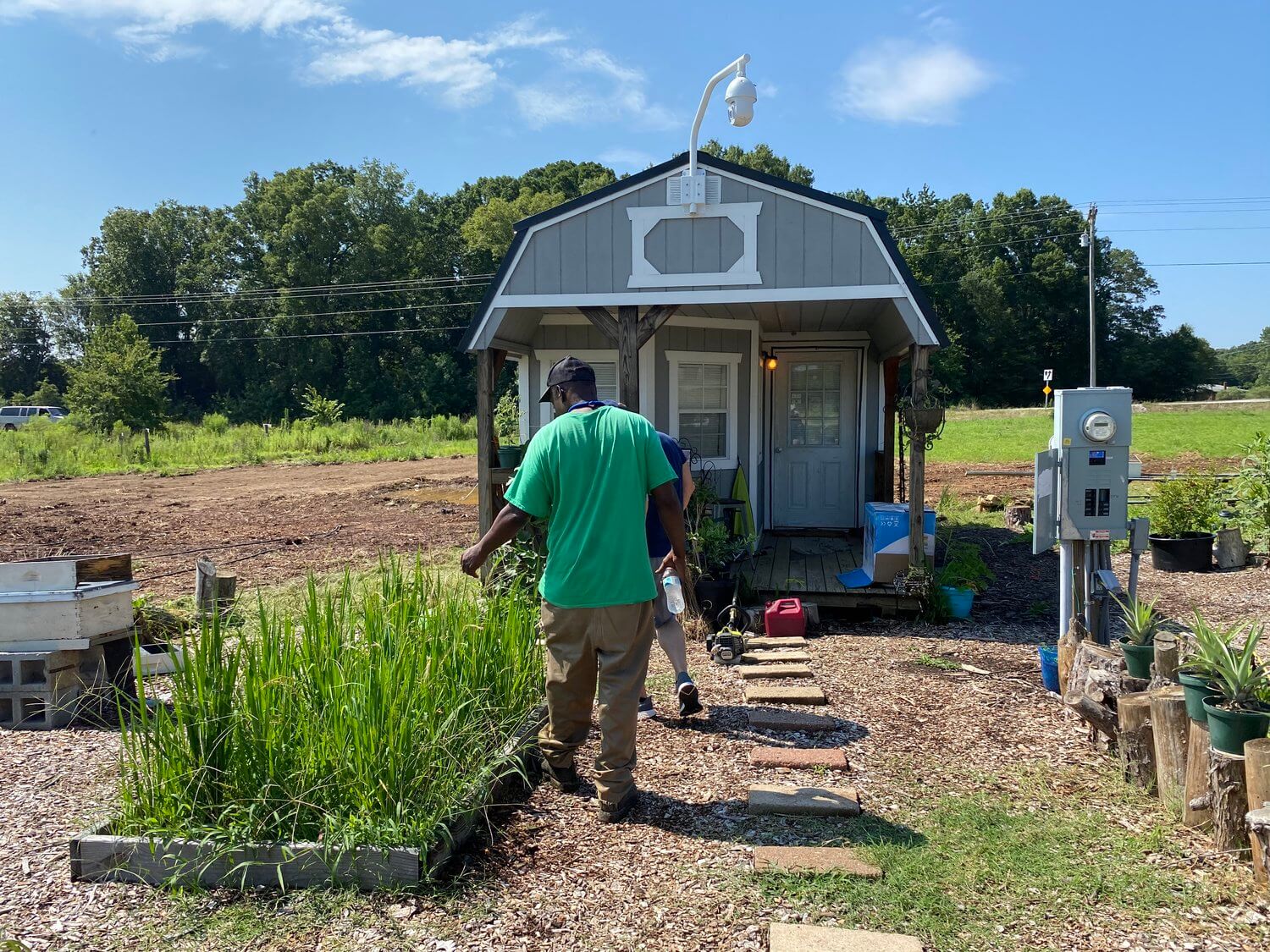
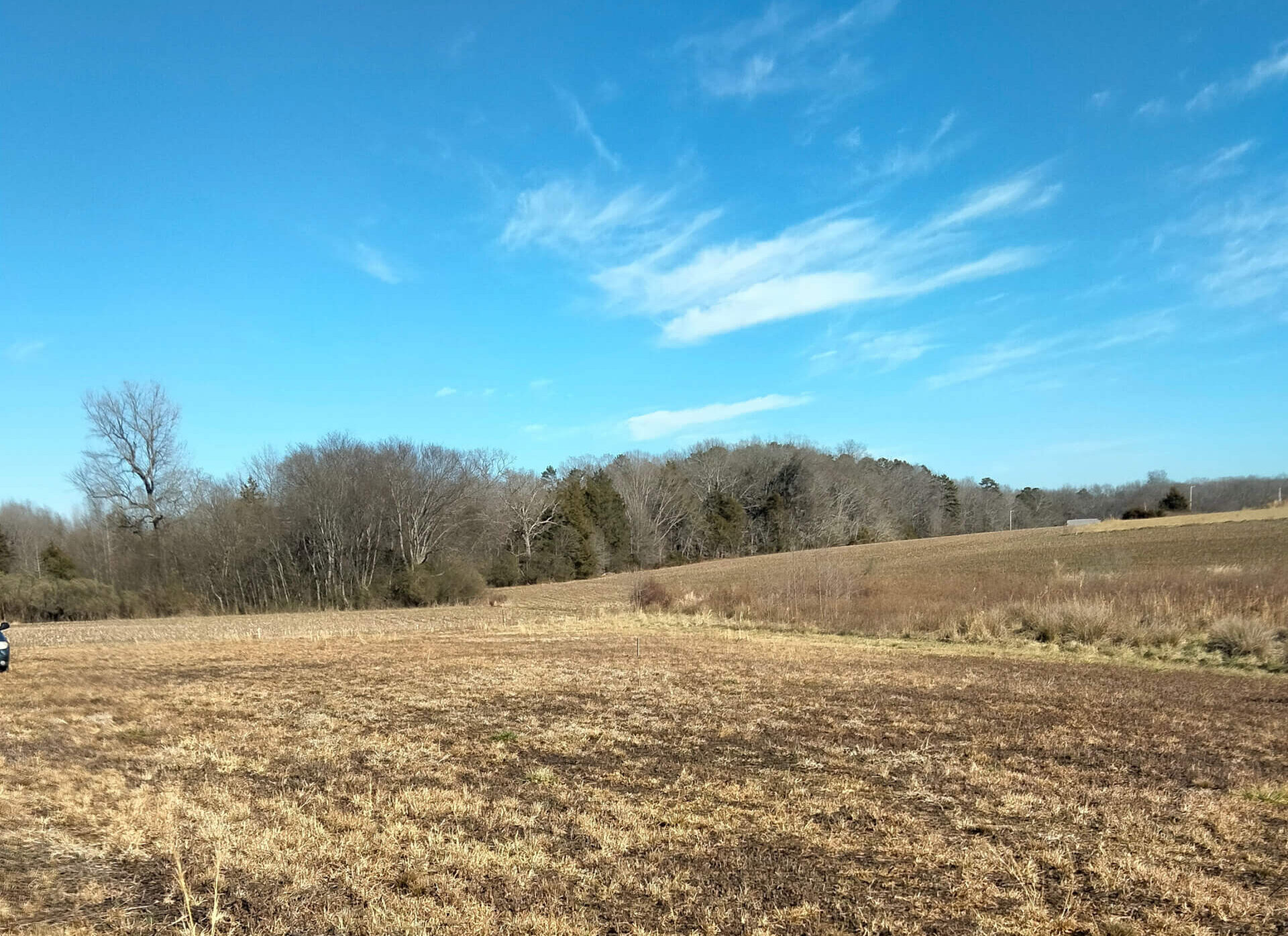
Civic Studio, Louisiana USA
Seeds + Beats expands a meadow planting at the New Orleans Mosquito, Rodent, and Termite Control Board in the Gentilly neighborhood by designing on site in alliance with the adjacent residential community. The project takes collaboration seriously, by engaging hands-on, in situ design, sidestepping costly construction documents, and acknowledging the inability for professional standards to solely meet community needs in the public realm. Aron Chang is an urban designer, co-lead for the Water Leaders Institute, and a co-founder and member of Civic Studio, a design collective focused on multi-disciplinary projects that support learning and dialog on critical civic issues.
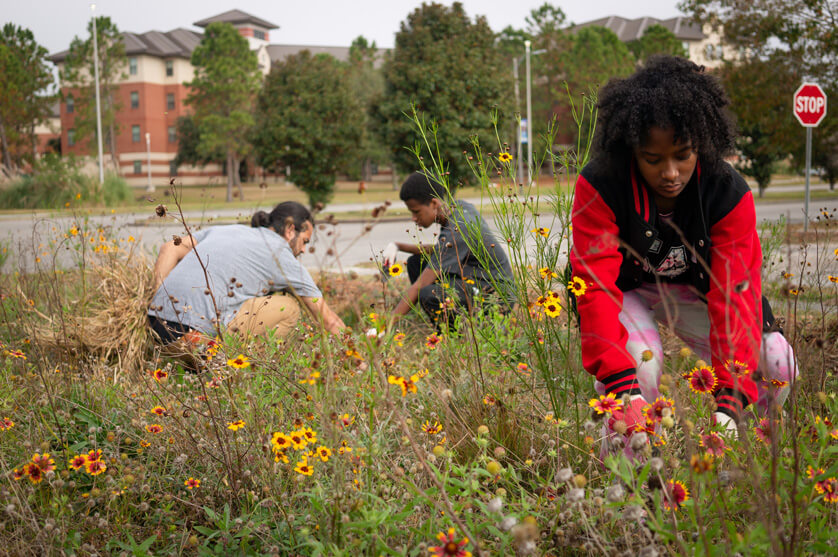
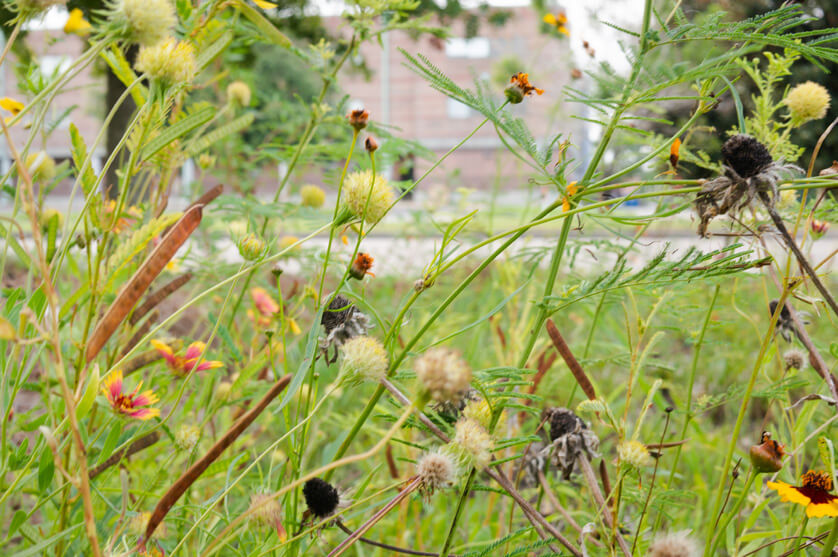
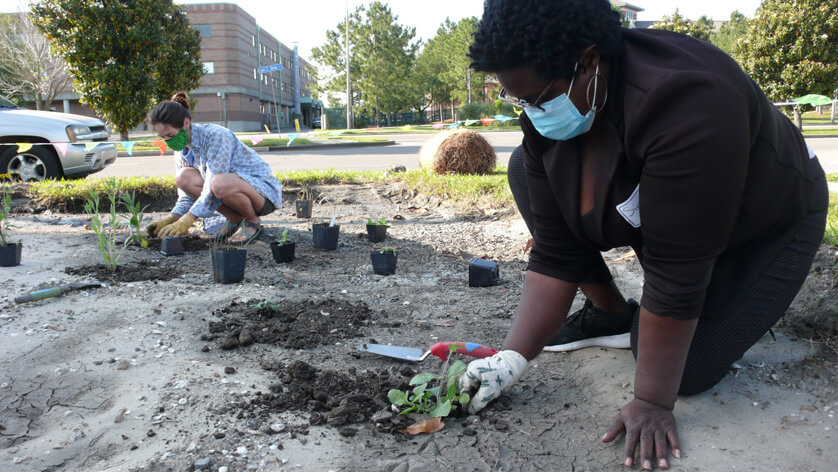
Ariel Page + Guy Dobyns, Washington USA
Mulch/Terrace/Live is an applied research project that introduces novel forms of terracing to re-establish plants across clear cut, formerly forested land in the Pacific Northwest. Long-term stewardship of the land includes the process of documenting management practices including steps to controlling aggressive species with minimally invasive methods, approaches to low-input soil building, with demonstrated alternatives to annual cultivation with the introduction of seedlings. Page is a restoration gardener, working primarily with perennial edible plants through her company Planetary Garden Care. Dobyns is a hiking guide, member of the Conservation Futures Committee in Jefferson County, and co-founder of the Many Trees Project.
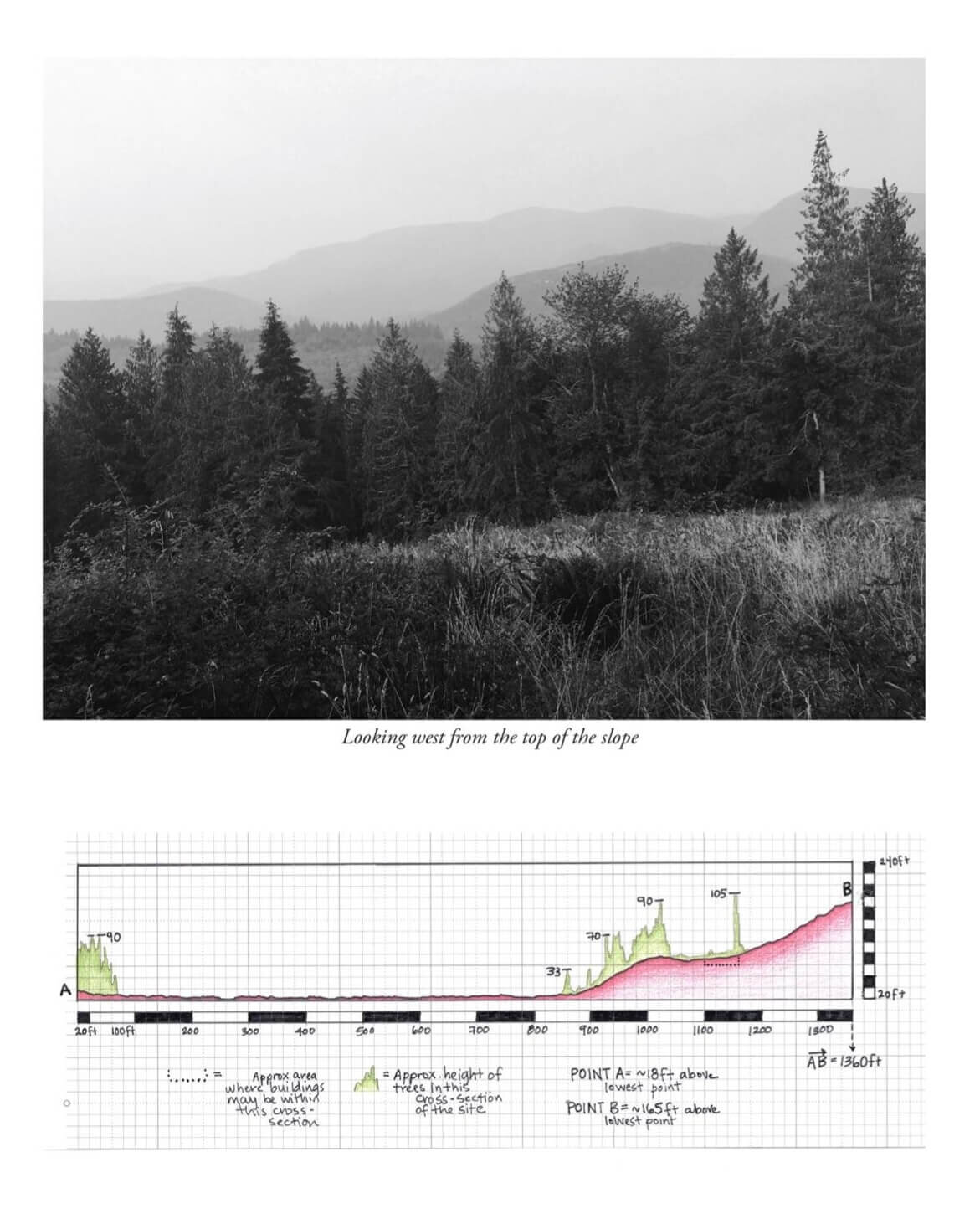
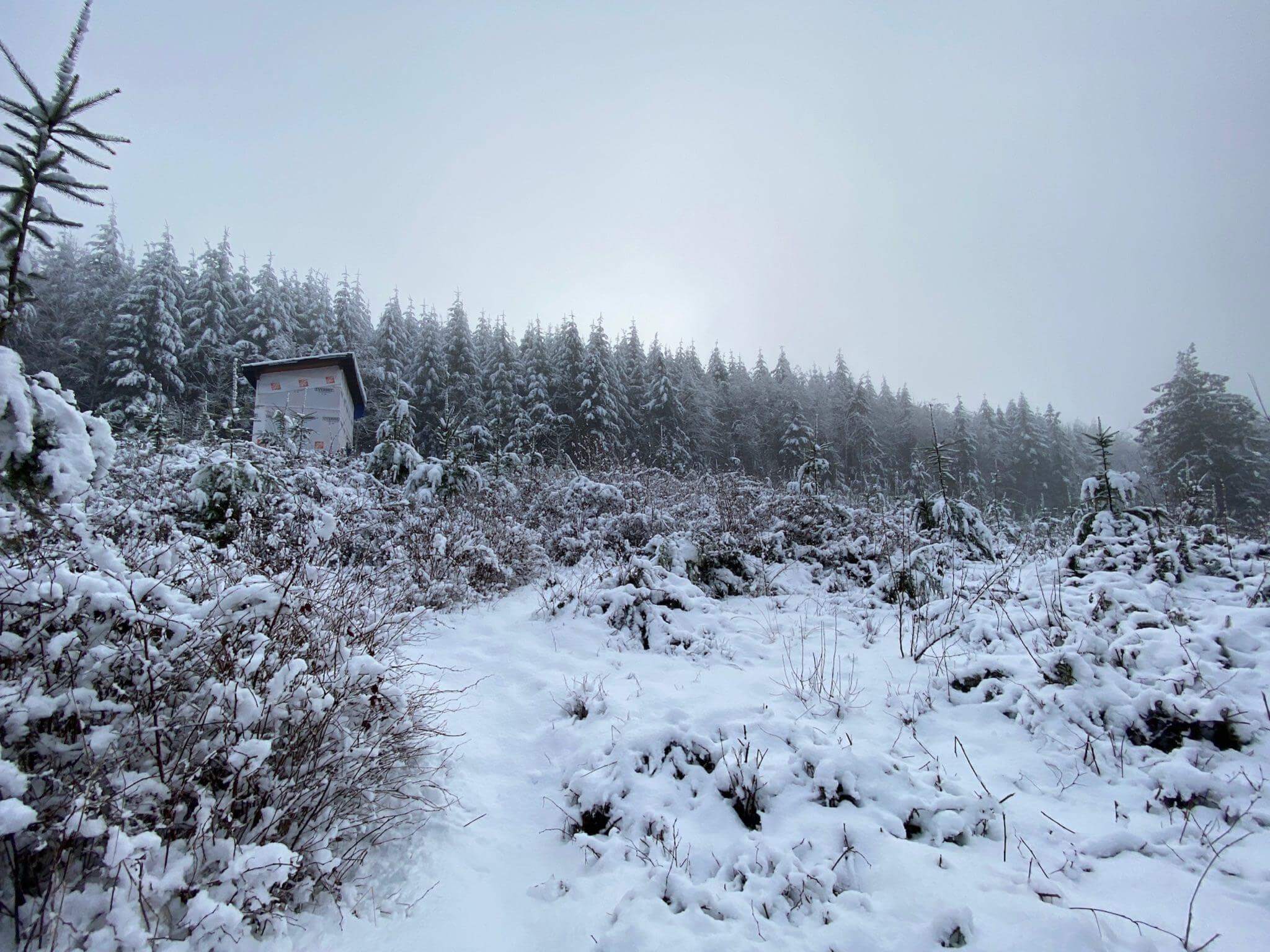
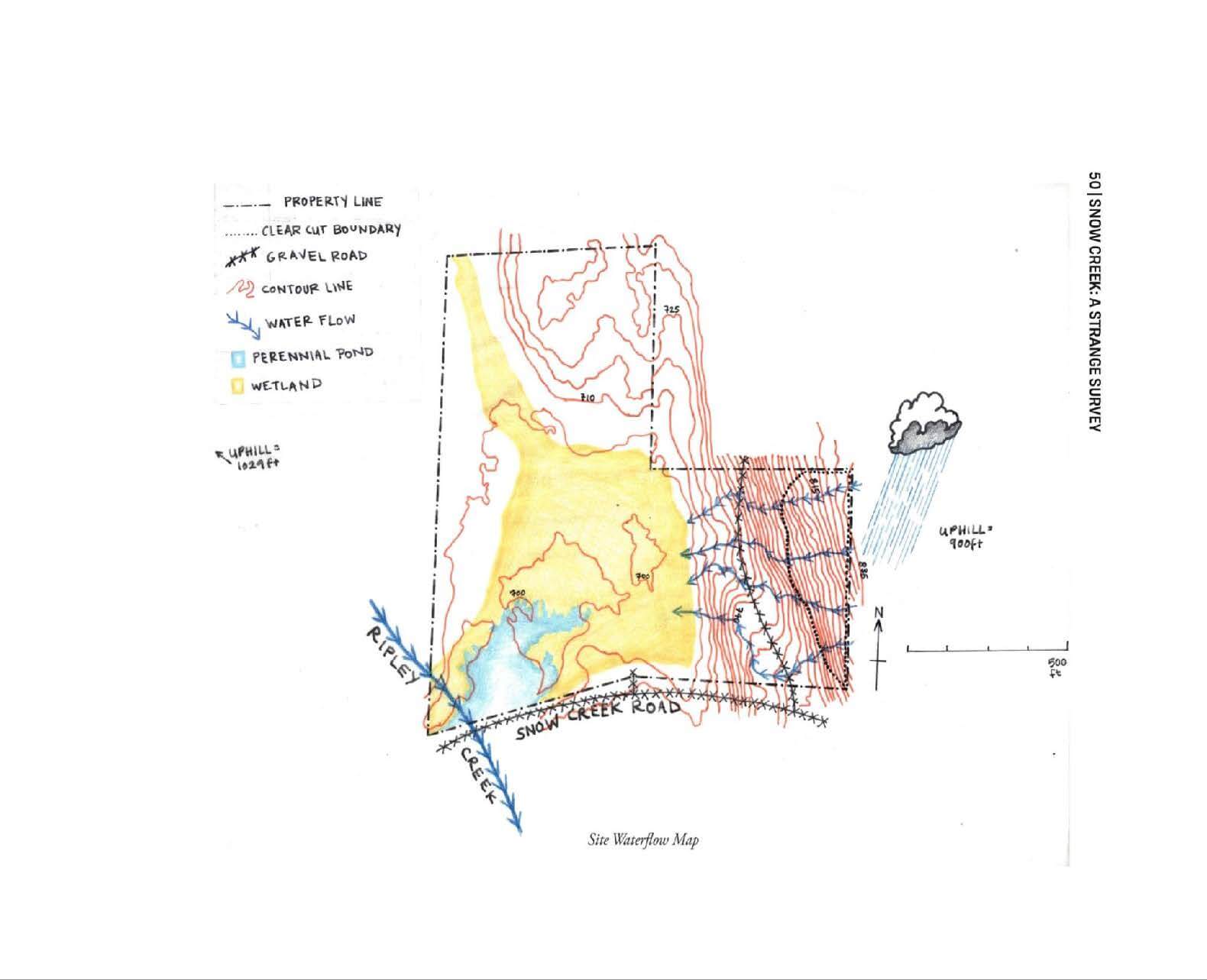
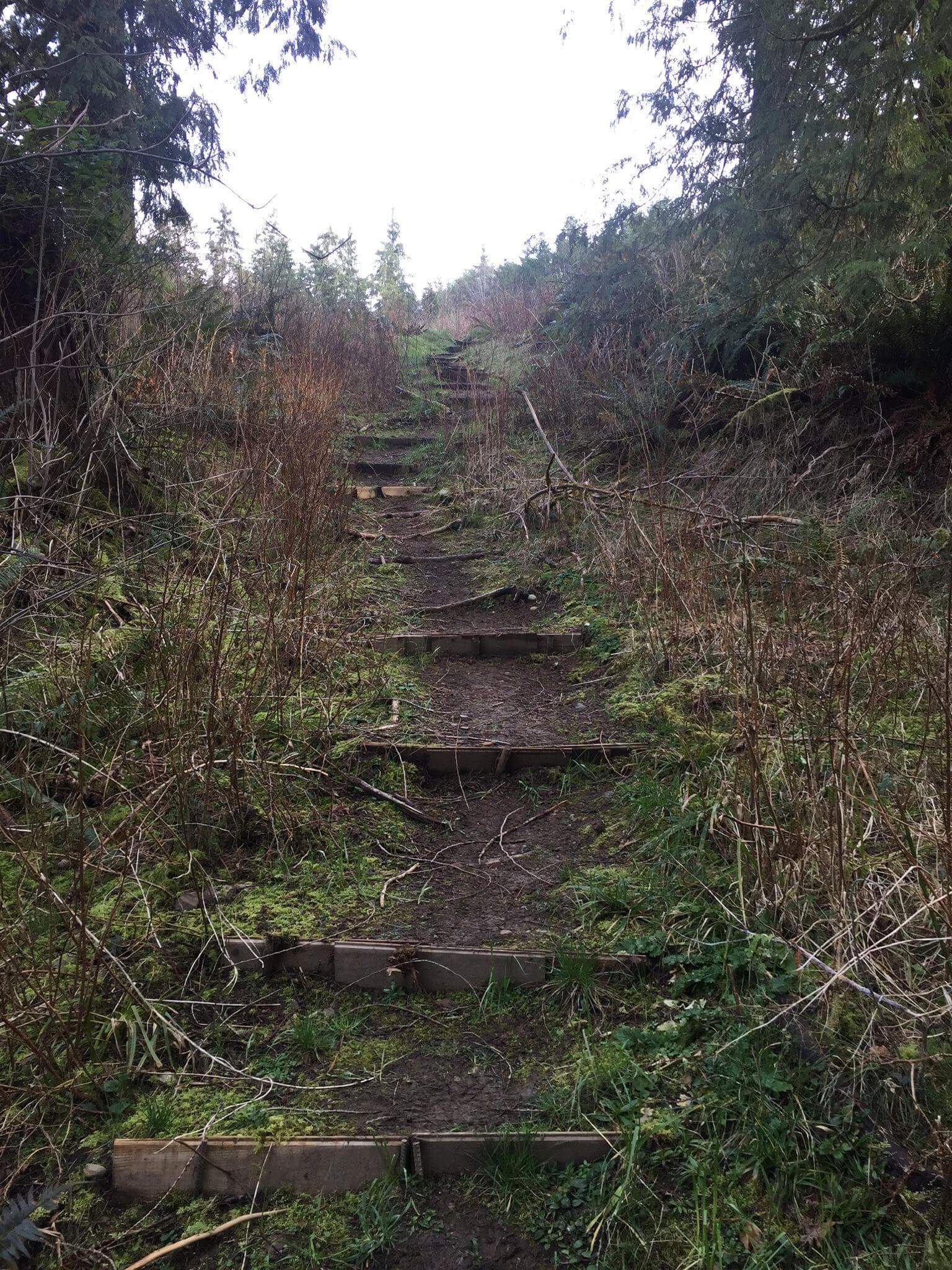
Content
Content
Mulch/Terrace/Live Manual 2022 Award Winners Ariel Page + Guy Dobyns, Washington USA
Mulching/Terracing/Living is an applied research project that introduces novel forms of terracing to re-establish plants across clear cut, formerly forested land in the Pacific Northwest. Long-term stewardship of the land includes the process of documenting management practices including steps to controlling aggressive species with minimally invasive methods, approaches to low-input soil building, with demonstrated alternatives to annual cultivation with the introduction of seedlings.
This manual describes techniques for clearing invasive species, remediating soil on a clearcut slope, and encouraging the development of food-bearing terraces through slow processes of observing, mulching, planting, and observing again. At its simplest, it is a technical manual for developing food forests in a degraded clearcut slope in the Pacific Northwest, and the techniques described are site-based and specific.
Donate & Support
Thank you to our many anonymous donors and the following sponsors:
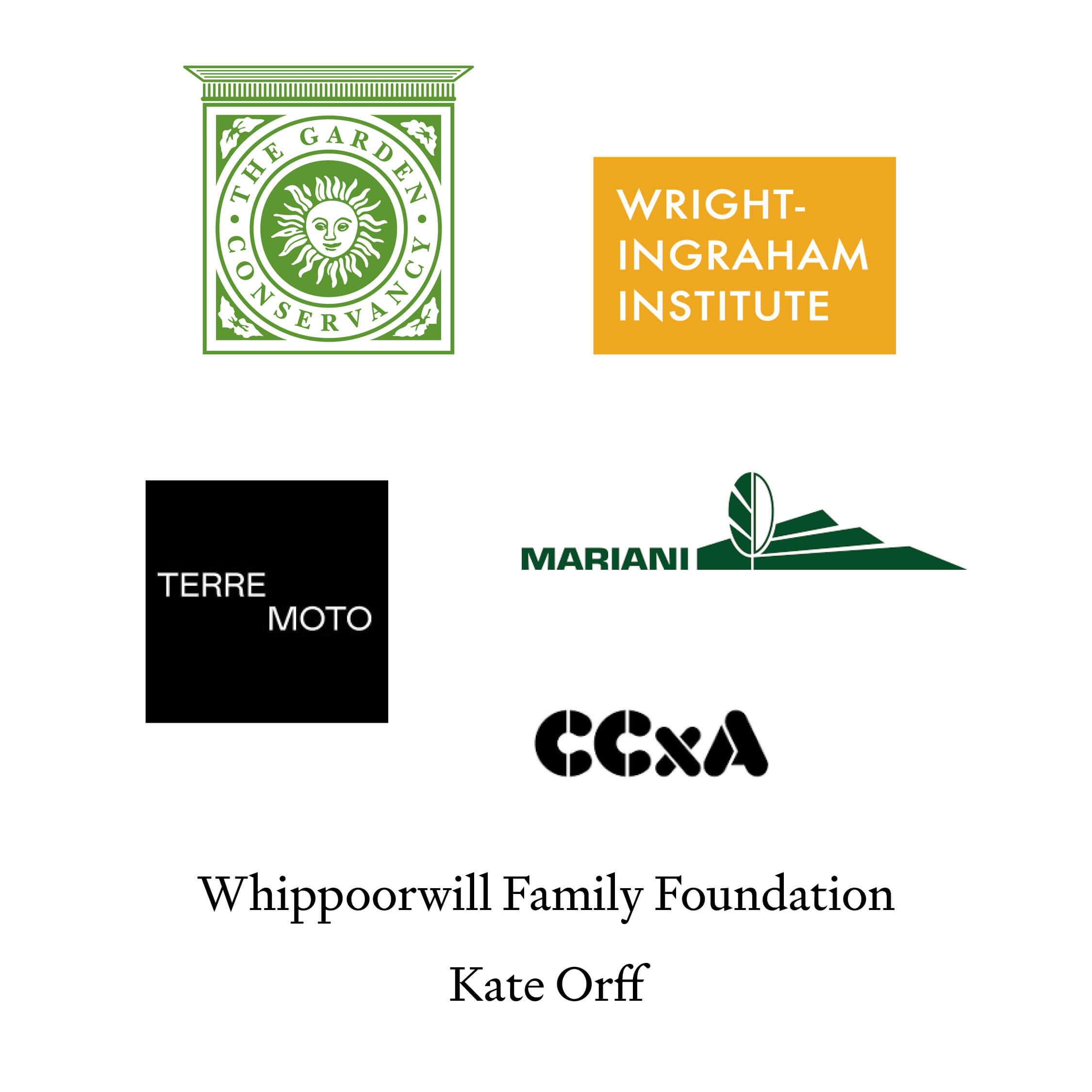
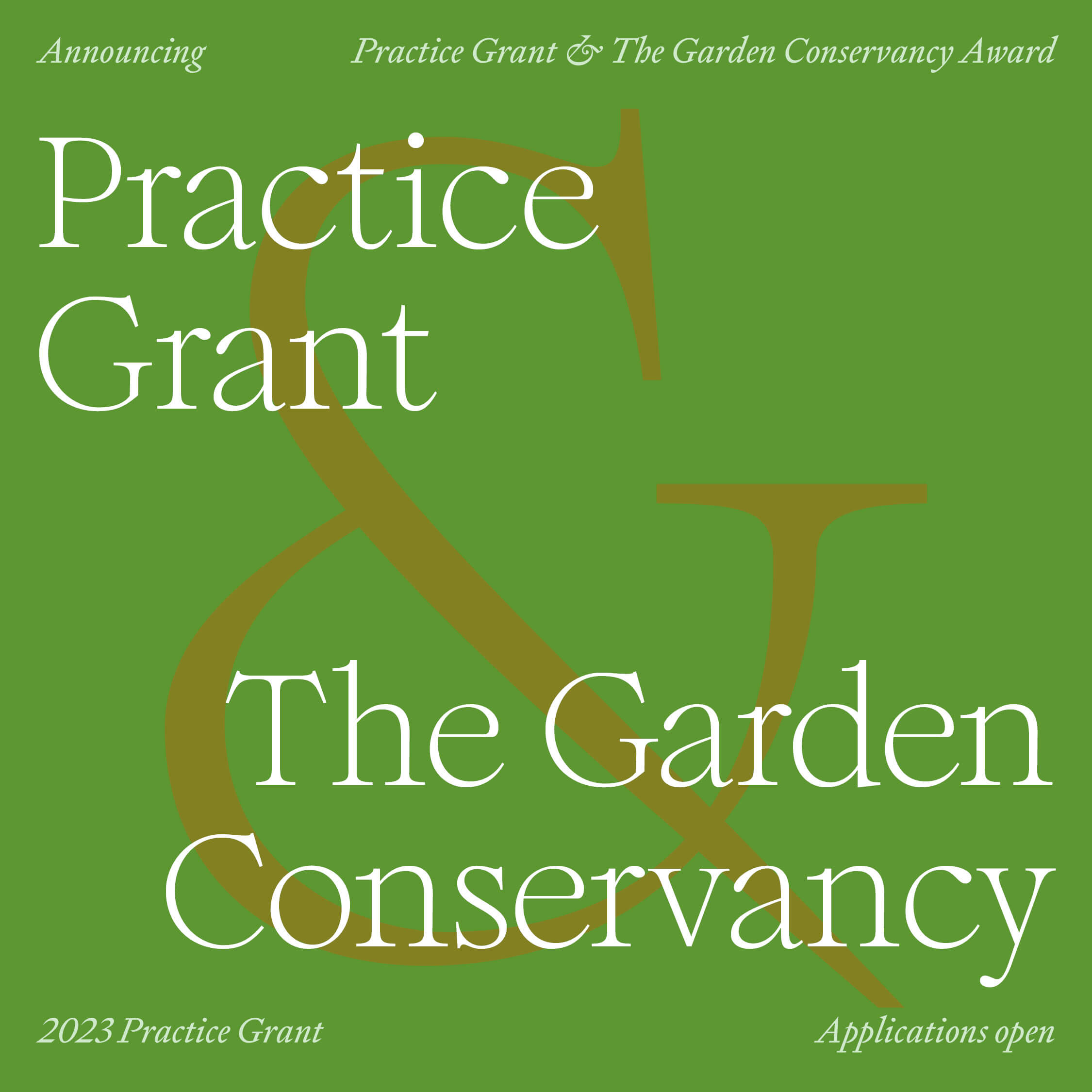
The Practice Grant is an initiative of the Practice Foundation and is a tax-exempt 501(c)(3).
EIN: 85-4128040
The Practice Foundation is a nonprofit regranting organization committed to opening access and expanding approaches to the design of the living environment. It is the mission of Practice Foundation to support land-based practices rooted in diverse communities, spaces of injustice and across rural and remote regions. As landscape designers, architects, gardeners, and academics we initiated the Practice Foundation because we identified a gap between the needs of emerging landscape designers and makers, and their access to opportunities for project development and implementation.
We believe in the value of practice itself, the measure of daily rituals and the reprise of community action. Some of the smallest, dedicated actions accumulate as powerful tools in the face of rapid climate change, loss in biodiversity, and unchecked development.
